DOWNLOAD NEWS 2016/2
By Brian Wilson
Download News 2016/1 is here
and the index of earlier editions is here.
Index 2016/2:
ALWYN Alwyn conducts Alwyn_Lyrita
— Lyra Angelica, etc._Chandos
— Violin Concerto; Miss Julie Suite_Naxos
— Piano Concertos_Chandos_Naxos
AVISON Concerti Grossi after Scarlatti_Berlin Classics
BIBER, KERLL, etc Imitatio_Mirare
BOULEZ Pli selon pli_DG
DELIUS Overview of various recordings_Naxos_EMI_Nimbus_Chandos_Beulah
DVOŘÁK Cello Concerto (+ MARTINŮ)_BIS
GABRIELI, Andrea Sacræ Cantiones_Christophorus
— Missa Pater peccavi, etc._Hyperion
GABRIELI, Andrea and Giovanni A New Venetian
Coronation_Signum
HANDEL Water Music_Harmonia Mundi (+ Fireworks Music_CPO_Hyperion_Glossa)
LECLAIR Scylla et Glaucus_Alpha
— Trio Sonatas_Fuga Libera_Chandos_Harmonia Mundi
— Violin Concertos_Chandos
MALLING Organ Music_Toccata
MARTINŮ Suites from Špalíček; Rhapsody-Concerto_Chandos
— Concertino and Concerto for Piano Trio_Ars Production
— Cello Concert (see DVOŘÁK)
— Symphonies — various recordings_BIS-Chandos_Supraphon
— String Trio No.1; Fêtes Nocturnes; Piano Quartet
No.1; String Quintet_Alpha
MESSIAEN Chronochromie; La Ville d'en haut; Et
exspecto resurrectionem mortuorum_DG
PACHELBEL Hexachordum Apollinis_Harmonia Mundi
RAMEAU Les Fêtes de Polymnie_Glossa
RESPIGHI Ancient Airs and Dances Suite 1; The Birds, Il Tramonto_Atma
— Ancient Airs and Dances Suites 1-3; The Birds_CPO
— La Boutique fantasque, The Birds_CPO
— and several benchmark and comparative recordings.
RÓŻYCKI Piano Concertos_Hyperion
SAINT-SAËNS Violin Concertos 1-3_Analekta
— Cello Concertos; Carnival of the Animals_Chandos
— Symphony 3; Piano Concerto 4_Musicales Actes Suds
— Piano Concertos 2 and 5_Aparté
STRAVINSKY Rite of Spring_Sony
WEINBERG Concertino; Symphony No.10_CPO
WIDOR La Nuit de Walpurgis; Violin Concerto; Symphony
No.1_Dutton
BAX, VAUGHAN WILLIAMS, FINZI, etc.: English Landscapes_Hallé
BEETHOVEN, HAYDN, MENDELSSOHN Sir John Barbirolli Symphonies:2_Beulah
BERLIN, etc. Puttin' on the Ritz_Chandos
CHARPENTIER, LECLAIR, RAMEAU Comédie et Tragédie:
2_Chandos
Hamilton & Hamilton Live in Bern (Jazz)_Caprice
LECLAIR, RAMEAU, etc. Tragédiennes_Erato
A Song of Farewell – Music of Mourning and Consolation_Signum
WEISS, VIVALDI, BACH Lute Music_Linn
***
Music at San Marco
Andrea GABRIELI (1532/33-1585)
Sacræ Cantiones (1565)
Laudate Dominum omnes gentes [2:32]
Laudate Dominum in sanctis eius á10 (from Concerti
di Andrea et di Giovanni Gabrieli 1587) [3:09]
Laudate Dominum (instrumental) [4:44]
Bonum est confiteri: prima pars [2:19]; secunda pars [2:00]
Domine, quid multiplicati: prima pars [2:47]; secunda pars [3:45]
Sic Deus dilexit mundum [3:25]
Sancta et immaculata [2:59]
O sacrum convivium [2:48]
Lætare Ierusalem [2:47]
Verba mea auribus: prima pars [2:33]; secunda pars [2:26
O sacrum convivium [2:57
O lux beata Trinitas [2:59]
Deus noster refugium: prima pars [2:19]; secunda pars [2:50]
Levavi oculos meos: prima pars [2:56]; secunda pars [1:24]; terzia
pars [2:57]
Domine Dominus noster: prima pars [3:29]; secunda pars [2:41]
Ensemble Officium/Wilfried Rombach
Rec. Evangelical Church Peter und Paul Mössingen, 24 September
2013, 30 September - 2 October 2014; Catholic Parish Church St. Johannes
Tübingen, 30 July 2015. DDD
Latin texts and German translations included.
CHRISTOPHORUS CHR77390 [63:42] - from eclassical.com
(mp3 and lossless, with pdf booklet)
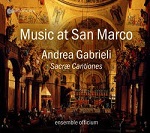 Andrea
Gabrieli’s music is less well-known than that of his nephew Giovanni
but it was of great importance in establishing the characteristic Venetian
sound which came to full fruition in the music of Monteverdi. Venice
may have been a little slower than the rest of North Italy in adopting
renaissance painting, but when it did it developed a startlingly colourful
style*. In music Venice was by no means slow but that of the Gabrielis
and Monteverdi is as colourful as Venetian painting. These performances
of selections from the 1565 Sacræ Cantiones bring out all
the colour of the music, very different from Palestrina’s music
of the same period, and are well recorded and documented apart from
the lack of an English translation of the texts. (There is an English
version of the notes.)
Andrea
Gabrieli’s music is less well-known than that of his nephew Giovanni
but it was of great importance in establishing the characteristic Venetian
sound which came to full fruition in the music of Monteverdi. Venice
may have been a little slower than the rest of North Italy in adopting
renaissance painting, but when it did it developed a startlingly colourful
style*. In music Venice was by no means slow but that of the Gabrielis
and Monteverdi is as colourful as Venetian painting. These performances
of selections from the 1565 Sacræ Cantiones bring out all
the colour of the music, very different from Palestrina’s music
of the same period, and are well recorded and documented apart from
the lack of an English translation of the texts. (There is an English
version of the notes.)
* Paul Hills Venetian Colour: New Haven and London: Yale University
Press, 1999.
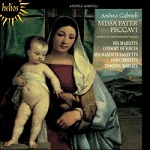
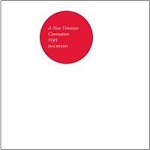 Those
looking for more Andrea Gabrieli on his own could do very much worse
than investigate his Missa Pater peccavi and instrumental works,
performed by His Majesty’s Voices, Cornetts and Sackbutts/Timothy
Roberts (Hyperion Helios CDH55265). Robert Hugill though 'this
… an entrancing and convincing foray into Gabrieli’s sound-world
[which] should be on everyone’s library shelves' and the download
is no less desirable. One small reservation: since that
review was written Helios CDs have risen from budget- to full-price,
though the download is still not too expensive at £7.99 - from
hyperion-records.co.uk,
mp3 and lossless, with pdf booklet - and you may still find the CD from
some dealers for around £6.50.
Those
looking for more Andrea Gabrieli on his own could do very much worse
than investigate his Missa Pater peccavi and instrumental works,
performed by His Majesty’s Voices, Cornetts and Sackbutts/Timothy
Roberts (Hyperion Helios CDH55265). Robert Hugill though 'this
… an entrancing and convincing foray into Gabrieli’s sound-world
[which] should be on everyone’s library shelves' and the download
is no less desirable. One small reservation: since that
review was written Helios CDs have risen from budget- to full-price,
though the download is still not too expensive at £7.99 - from
hyperion-records.co.uk,
mp3 and lossless, with pdf booklet - and you may still find the CD from
some dealers for around £6.50.
Andrea Gabrieli’s music features, alongside that of Giovanni, on
A Venetian Coronation (Virgin/Erato 6026782) and its remake
A New Venetian Coronation (Signum SIGCD287) both with
the Gabrieli Consort and Players and Paul McCreesh. When I reviewed
the latter in DL Roundup 2012/2 it was from an mp3 download from classicsonline.com.
That’s no longer available but the album can be downloaded in better
(lossless) sound from eclassical.com
or classicsonlinehd.com
(16- and 24-bit). The COLHD 16-bit is better value at £7.99 (as
against $13.37) but eclassical score for the 24-bit at $19.90 (as against
£15.99).
Imitatio
Heinrich Ignaz Franz von BIBER (1644-1704)
Serenada à 5 [9:36]
Balletti Lamentabili à 4 [9:45]
Johann Heinrich SCHMELZER (1623-1680)
Sonata representativa (formerly attributed to Biber) [11:33]
Sonata à viol è viola [6:36]
Serenata con altre arie à 5 [7:07]
Alessandro POGLIETTI (?-1683)
Toccatina sopra la Ribellione di Hungheria
Johann Kaspar KERLL (1627-1693)
Halter. Der steyrische Hirt [3:42]
Heinrich Ignaz Franz von BIBER
Sonata VI [13:01]
Johann Kaspar KERLL
Sonata A.3. ex G.Bmol [7:15]
Heinrich Ignaz Franz von BIBER
Battalia [10:47]
Ricercar Consort (Sophie Gent, Tuomo Suni [violins]; Philippe Pierlot
[alto & bass viols]; Kaori Uemura, Rainer Zipperling [bass viols];
Frank Coppieters [violone]; Maude Gratton [harpsichord]; Julien Wolfs
[organ, harpsichord])/Philippe Pierlot
With Matthias Vieweg (voice of the Nachtwächter), Sara Kuijken
(violon), Frederik Hildebrand (viol) and Sanne Deprettere (violone)
rec. L’église de Beaufays, December 2014. DDD
MIRARE MIR302 [79:22] – from eclassical.com
(mp3, 16- and 24-bit lossless with pdf booklet)
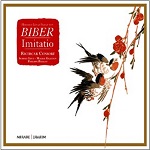 I
was slightly surprised and disappointed to discover that the wonderfully
zany Sonata representativa with its imitation of birds and farmyard
noises, which I have for long thought the epitome of Biber’s Stylus
fantasticus, is now thought to be by Kerll. There was clearly some
mutual borrowing between the two because the Musquetir Mars (musketeers’
march) which it includes also occurs in Biber’s Battalia. No
matter who composed what, the sonata exactly suits the Imitatio
theme of this album. The music is all immediate in its appeal and it’s
all very well performed and recorded.
I
was slightly surprised and disappointed to discover that the wonderfully
zany Sonata representativa with its imitation of birds and farmyard
noises, which I have for long thought the epitome of Biber’s Stylus
fantasticus, is now thought to be by Kerll. There was clearly some
mutual borrowing between the two because the Musquetir Mars (musketeers’
march) which it includes also occurs in Biber’s Battalia. No
matter who composed what, the sonata exactly suits the Imitatio
theme of this album. The music is all immediate in its appeal and it’s
all very well performed and recorded.
Even the mp3 sounds fine but it’s worth paying a little extra for 24-bit
($21.43). At $17.86 the mp3 and 16-bit versions are actually only pence
less expensive than the CD (target price £12.75). The booklet is excellent
but the words of the Nachtwächter (Night Watchman) in the opening
Serenada are tucked away on p.13.
If the Biber works here catch your fancy, your next stop should be the
2-CD set of his eight violin sonatas and other works, including theSonata
representativa, then attributed to him, performed by Romanesca (Harmonia
Mundi budget-price HMG507344/5 – CD or download from Presto;
subscribers can stream from Qobuz).
Johann PACHELBEL (1653-1706)
Hexachordum Apollinis [65:03]
John Butt (organ) - Gregg Harold Organ, Hertz Hall, UCAL, Berkeley,
California.
released in 1991.
HARMONIA MUNDI HMU907029 [65:03] – from eclassical.com
(mp3 and lossless, NO booklet)
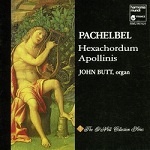
I mentioned this recording some time ago in the context of a review
of a reissue on the 2xHD label of some other Pachelbel organ works,
recorded by Bernard Lagacé in 1971 (Organ Jewels of the XVII Century:
2xHDJD1033). Neither that nor any other 2xHD recordings seem
now to be available from eclassical.com but Organ Jewels can
be streamed
(by subscribers) or purchased in 16-bit lossless from Qobuz.
No matter: this Harmonia Mundi recording is very good, indeed, and the
download thoroughly recommendable apart from the lack of a booklet:
eclassical.com are normally very obliging in that regard, so I presume
that Harmonia Mundi are to blame.
Sylvius Leopold WEISS (1687-1750)
Lute Sonata No. 29 in a minor, WeissSW29 (L’infidèle) [18:59]
Prelude in C [6:21]
Fantasia in C [3:57]
Fugue in C [6:21]
Antonio VIVALDI (1678-1741) Concerto in F, transcribed for lute
by Nigel North, after Antonio Vivaldi’s Violin Concerto in D, Op.3/9,
RV230 and J.S. Bach Concerto in D, BWV972 [9:06]
Sylvius Leopold WEISS Tombeau sur la mort de M. Comte de Logy
[7:50]
Johann Sebastian BACH (1685-1750) Violin Partita No.2, BWV1004:
Chaconne [14:01]
Nigel North (lute)
rec. St Martin’s Church, East Woodhay, Newbury, UK, 23–26 March 1990.
DDD
LINN BKD006 [60:14] – from eclassical.com
or linnrecords.com
(mp3 and lossless, with pdf booklet). Also on CD from Linn.
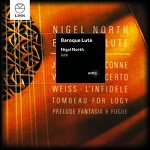 For
reasons which escape me Linn are replacing their earlier releases with
new catalogue numbers, substituting BKD for CKD, and blotting out part
of the cover design with an ugly black square. That apart, this remains
as recommendable as any of Nigel North’s recordings for Linn and other
companies. Don’t expect the Weiss ‘Sonata’ to hang together like the
later classical model: it’s better described as a suite of dances: entrée,
courante, sarabande, menuet, musette and paysanne. The concerto
‘after Vivaldi’ sounds quite different from both the original and Bach’s
arrangement, which North also draws on, but is an enjoyable work in
its own right.
For
reasons which escape me Linn are replacing their earlier releases with
new catalogue numbers, substituting BKD for CKD, and blotting out part
of the cover design with an ugly black square. That apart, this remains
as recommendable as any of Nigel North’s recordings for Linn and other
companies. Don’t expect the Weiss ‘Sonata’ to hang together like the
later classical model: it’s better described as a suite of dances: entrée,
courante, sarabande, menuet, musette and paysanne. The concerto
‘after Vivaldi’ sounds quite different from both the original and Bach’s
arrangement, which North also draws on, but is an enjoyable work in
its own right.
Your main sources of downloads of Linn recordings are Linn’s own website
and Hyperion but, for some reason, Hyperion don’t have this album and
not all dealers seem to stock the CD. At $10.84 against Linn’s £10.00
the eclassical download offers the better value.
George Frideric HANDEL (1685-1759)
Water Music HWV 348-50 (1717)
Suite No.1, HWV348 [26:40]
Suite No.2, HWV349 [11:07]
Suite No.3, HWV350 [10:35]
Akademie für Alte Musik Berlin
rec. November 2015, Teldex Studio Berlin. DDD
HARMONIAN MUNDI HMC902216 [48:22] - from eclassical.com
(mp3, 16- and 24-bit lossless, with pdf booklet)
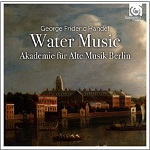 The
obvious comparison is with the King’s Consort on Hyperion, my favourite
period-instrument recording of the Water Music (CDH55375
– from
hyperion-records.co.uk, mp3 and lossless, with pdf booklet, or CD:
see DL
Roundup April 2012/1). In one respect the Hyperion remains ahead
of the new Harmonia Mundi: it’s surely against the trend of modern scholarship
to continue to offer the music in the form of three suites and Robert
King combines HWV349 and 350 into one 19-minute sequence. I also thought
the King’s Consort horns a little easier on the modern ear; not that
the Berlin players demonstrate the same problems as those which used
to beset period performance. Otherwise I enjoyed the new recording,
the odd tempo query apart, and the 24-bit sound is an added inducement,
though the 16-bit Hyperion still sounds well.
The
obvious comparison is with the King’s Consort on Hyperion, my favourite
period-instrument recording of the Water Music (CDH55375
– from
hyperion-records.co.uk, mp3 and lossless, with pdf booklet, or CD:
see DL
Roundup April 2012/1). In one respect the Hyperion remains ahead
of the new Harmonia Mundi: it’s surely against the trend of modern scholarship
to continue to offer the music in the form of three suites and Robert
King combines HWV349 and 350 into one 19-minute sequence. I also thought
the King’s Consort horns a little easier on the modern ear; not that
the Berlin players demonstrate the same problems as those which used
to beset period performance. Otherwise I enjoyed the new recording,
the odd tempo query apart, and the 24-bit sound is an added inducement,
though the 16-bit Hyperion still sounds well.
48 minutes is very short by modern CD standards – the Hyperion Helios,
though no longer on sale at budget price*, adds a sizeable 20-minute
bonus in the form of the Fireworks Music – 66 minutes in all
– but eclassical.com’s per-second charging policy partly compensates,
especially when 24-bit is initially on offer at the same price as mp3
and 16-bit. On the other hand I notice that ‘per-second’ means different
things for different labels and Harmonia Mundi seem to be at the top
of the range, so $13.54 is not over-generous for mp3 and 16-bit.
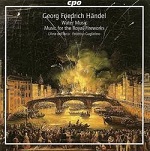 Also
very well worth considering: the CPO recording of the Water Music
and Fireworks Music by L’Arte dell’Arco which Margarida Mota-Bull
so emphatically enjoyed (7773122 – review).
eclassical.com
offer that, too: mp3 and lossless, with pdf booklet: more music and
for less than the new Harmonia Mundi, at $11.85. At current rates that’s
almost exactly the same price as the Hyperion download, with which it
seriously vies now for top place in my affection. As usual the Berlin
AAM produce a rather fuller sound than one usually hears from period
ensembles; if that’s not to your taste the lithe sound of L’Arte dell’Arco
could be your ideal antidote.
Also
very well worth considering: the CPO recording of the Water Music
and Fireworks Music by L’Arte dell’Arco which Margarida Mota-Bull
so emphatically enjoyed (7773122 – review).
eclassical.com
offer that, too: mp3 and lossless, with pdf booklet: more music and
for less than the new Harmonia Mundi, at $11.85. At current rates that’s
almost exactly the same price as the Hyperion download, with which it
seriously vies now for top place in my affection. As usual the Berlin
AAM produce a rather fuller sound than one usually hears from period
ensembles; if that’s not to your taste the lithe sound of L’Arte dell’Arco
could be your ideal antidote.
The slightly ripe-sounding horns of Le Concert Spirituel directed by
Hervé Niquet are my only small reservation about their coupling of the
Water Music and Fireworks (Glossa GCD921616, hybrid
SACD).
Bargain hunters will find much to enjoy in the Naxos recording of the
Water Music and Fireworks from Kevin Mallon’s Aradia Ensemble
(8.557764) – stream
for subscribers or download
from classicsonlinehd.com, with pdf booklet.
* Some dealers still have the CD for around £6.50. The download comes
at £7.99 which, at current exchange rates, is less than the Harmonia
Mundi from eclassical.com.
Comédie et Tragédie Vol. 2
Jean-Marie LECLAIR (1697-1764)
Suite from Scylla et Glaucus, Op.11 (1746) [30:43]
Marc-Antoine CHARPENTIER (1643-1704)
Suite from Le Malade imaginaire, H495 (1673) [12:05]
Jean-Philippe RAMEAU (1683-1764)
Suite from Les Fêtes de Polymnie [30:39]
Tempesta di Mare, Philadelphia Baroque Orchestra
rec. Gould Recital Hall, Curtis Institute of Music, Philadelphia, Pennsylvania,
USA, 8–10 June 2015. DDD
CHANDOS CHACONNE CHAN0810 [73:29] – from theclassicalshop.net
(mp3 and lossless with pdf booklet)
Jean-Marie LECLAIR (1697-1764)
Scylla et Glaucus (1746)
Emöke Barath (Scylla), Anders Dahlin (Glaucus), Caroline Mutel (Circé),
Virginie Pochon (Dorine/Vénus), Marie Lenormand (Amour/Témire), Frédéric
Caton (Hécate/Chef des peuples)
Les Nouveaux Caractères/Sébastien D’Hérin
rec. 29 October-4 November 2014, Opéra Royal du Château de Versailles,
France. DDD
Texts and translations included.
ALPHA ALPHA960 [50:48 + 49:55 + 59:05] – stream
(for subscribers) or download
from Qobuz (16- and 24-bit lossless, with pdf booklet).
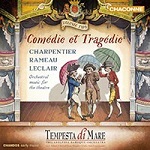 CHAN0810:
I thought the performances of Lully, Rébel and Marais on the first volume
in this series (CHAN0805) rather too sedate – review
– and I am not alone in finding other performances by Tempesta di Mare
somewhat lacking in both the power and sparkle that their tempestuous
name should imply. I’m sorry to say that the same comments apply to
Volume 2: this is beautiful music and it receives elegant and beautiful
performances but from the very first coup d’archet at the opening
of the Leclair it’s evident that there’s a slight lack of élan
about the proceedings. There’s only one rival recording of the Leclair
Suite and that’s on an over-the-top but hugely enjoyable Red Priest
album (RP002). This is the only recording of the Rameau Fêtes
de Polymnie Suite currently available but the whole opera-ballet
is well served by the recording from a distinguished team on Glossa
GCD923502 – download from eclassical.com
(mp3, 16- and 24-bit lossless with pdf booklet).
CHAN0810:
I thought the performances of Lully, Rébel and Marais on the first volume
in this series (CHAN0805) rather too sedate – review
– and I am not alone in finding other performances by Tempesta di Mare
somewhat lacking in both the power and sparkle that their tempestuous
name should imply. I’m sorry to say that the same comments apply to
Volume 2: this is beautiful music and it receives elegant and beautiful
performances but from the very first coup d’archet at the opening
of the Leclair it’s evident that there’s a slight lack of élan
about the proceedings. There’s only one rival recording of the Leclair
Suite and that’s on an over-the-top but hugely enjoyable Red Priest
album (RP002). This is the only recording of the Rameau Fêtes
de Polymnie Suite currently available but the whole opera-ballet
is well served by the recording from a distinguished team on Glossa
GCD923502 – download from eclassical.com
(mp3, 16- and 24-bit lossless with pdf booklet).
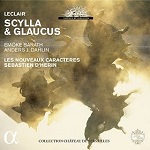 The
Alpha recording of the complete Scylla et Glaucus provides
an object lesson in how to perform the overture – as beautifully played
as on Chandos but with an extra lift that makes all the difference.
There’s the Red Priest alternative but none for the complete opera*,
Leclair’s only work in that genre, so it’s fortunate that performance,
recording and presentation are very good but I had some problems with
some of the tracks being cut short when I first downloaded the whole
album as a zip file. Only by downloading track by track was I able
to overcome the problem, which can be a somewhat cumbersome process.
Even then the Overture, which should run for 5:30 – and does so in 24-bit
wma or flac – is cut short at 5:26 in the 16-bit download. That means
purchasing the 24-bit version but, fortunately, even at £14.29 that
costs less than the 3-CD set and the booklet comes with the deal.
The
Alpha recording of the complete Scylla et Glaucus provides
an object lesson in how to perform the overture – as beautifully played
as on Chandos but with an extra lift that makes all the difference.
There’s the Red Priest alternative but none for the complete opera*,
Leclair’s only work in that genre, so it’s fortunate that performance,
recording and presentation are very good but I had some problems with
some of the tracks being cut short when I first downloaded the whole
album as a zip file. Only by downloading track by track was I able
to overcome the problem, which can be a somewhat cumbersome process.
Even then the Overture, which should run for 5:30 – and does so in 24-bit
wma or flac – is cut short at 5:26 in the 16-bit download. That means
purchasing the 24-bit version but, fortunately, even at £14.29 that
costs less than the 3-CD set and the booklet comes with the deal.
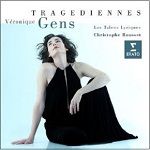 *
Some rather silly prices are being asked for John Eliot Gardiner’s Erato
recording, until recently available at mid-price.
*
Some rather silly prices are being asked for John Eliot Gardiner’s Erato
recording, until recently available at mid-price.
My Bargain of the Month comes in the form of an album of music
by Leclair and contemporaries from Véronique Gens and Les Talens Lyriques,
directed by Christophe Rousset, on a Virgin Classics/Erato recording
(3467622) available for £4.49 (mp3) or £5.99 (lossless) from
7digital.com.
It’s the first of three albums which she made with that generic title,
of which only the second is generally available even as a download.
The Overture and four extracts from Scylla et Glaucus feature
along with items from Armide, Castor et Pollux and other
operas. There’s NO booklet, however.
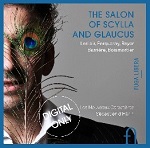
There’s an even livelier performance of the Overture to Scylla et
Glaucus on another release from Les Nouveaux Caractères and from
the Outhere stable: on an album entitled The Salon of Scylla et Glaucus
(Fuga Libera FUG729: download only). The composer’s own arrangement
for two violins and continuo is the first track on a programme of music
by Leclair, from his Op.2, Op.5 and Op.13 collections, interspersed
with music by Boismortier, Forqueray, Duphly, Barrière and Royer. The
booklet is somewhat rudimentary but everything else is first-rate.
The quality of the mp3 press preview from Outhere, though only at 256kb/s,
encourages me to assume that the
Qobuz download (16- and 24-bit, with booklet) should sound even
better.
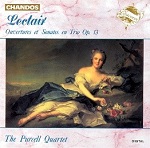
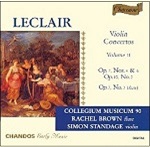
To make up for my lukewarm attitude to the new Chandos recording, I
suggest following up the Fuga Libera with Leclair’s Op.13 Trio Sonatas
– one of the sets not included in thatselection – performed in 1993
by The Purcell Quartet on Chandos Chaconne CHAN0542 – from theclassicalshop.net
(mp3 and lossless with pdf booklet). That’s just one of many fine recordings
of Leclair from Chandos. To select just one other almost at random,
Volume 2 of 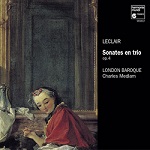
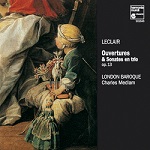 the
Violin Concertos from Collegium Musicum 90 and Simon Standage on CHAN0564.
the
Violin Concertos from Collegium Musicum 90 and Simon Standage on CHAN0564.
Another very fine collection of the Op.13 Trio Sonatas comes from London
Baroque on Harmonia Mundi HMC901646 – from eclassical.com,
in mp3 and lossless sound. The same performers offer the Op.4 Sonatas
on Harmonia Mundi HMC901617 – from eclassical.com
in mp3 and lossless sound. Neither comes with booklet.
Charles AVISON (1709-1770) Concerti Grossi after Scarlatti (1744)
Concerto grosso after Scarlatti, No.3 in d minor
Concerto grosso after Scarlatti, No.6 in D
Concerto grosso after Scarlatti, No.4 in a minor
Concerto grosso after Scarlatti, No.5 in d minor
Concerto grosso after Scarlatti, No.9 in C
Concerto grosso after Scarlatti, No.11 in G
Concerto Köln
rec. April 2015.
BERLIN CLASSICS 0300702BC – subscribers stream from Qobuz,
with pdf booklet
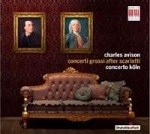 Qobuz
are asking way too much for the 16-bit download at £10.79 – little short
of what you should expect to pay for the CD. In any case, much as I
enjoyed these lively performances, there are two 2-CD sets of all twelve
concertos each of which can be had for the price of one: Divine Art
DDA21213 – from
theclassicalshop.net, mp3 and lossless: NO booklet – and Hyperion
Dyad CDD22060 – from hyperion-records.co.uk,
mp3, lossless and CD. Though the streamed/downloaded version comes
with the booklet, that booklet is most unhelpful in not offering any
indication of individual or overall playing times; I didn’t have time
to do the maths, so I have had to omit them.
Qobuz
are asking way too much for the 16-bit download at £10.79 – little short
of what you should expect to pay for the CD. In any case, much as I
enjoyed these lively performances, there are two 2-CD sets of all twelve
concertos each of which can be had for the price of one: Divine Art
DDA21213 – from
theclassicalshop.net, mp3 and lossless: NO booklet – and Hyperion
Dyad CDD22060 – from hyperion-records.co.uk,
mp3, lossless and CD. Though the streamed/downloaded version comes
with the booklet, that booklet is most unhelpful in not offering any
indication of individual or overall playing times; I didn’t have time
to do the maths, so I have had to omit them.
Subscribers can stream the Divine Art from classicsonlinehd.com
NO booklet. NB: the download is over-priced since it makes no
allowance for the 2-for-1 status, so costs more than the CDs.
See also review
by John France.
Sir John Barbirolli Symphonies Volume 2
Joseph HAYDN (1732-1809) Symphony No.104 in D (‘London’) [26:07]
rec. 1928, Queen’s Hall, London. 78s/ADD mono
Felix MENDELSSOHN (1809-1847) Symphony No.4 in A, Op.90 (‘Italian’)
[26:35]
rec. 1961, Berne, Switzerland. ADD mono
Ludwig van BEETHOVEN (1770-1827) Symphony No.8 in F, Op.93 [26:20]
rec. 1958, London. ADD stereo
The Hallé Orchestra/Sir John Barbirolli
BEULAH 2PDR17 [79:03] Due shortly from iTunes.
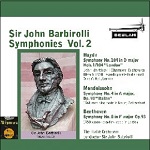 An
interesting selection of Barbirolli recordings to add to the recent
Beulah first volume, though nothing here is of vital importance.
An
interesting selection of Barbirolli recordings to add to the recent
Beulah first volume, though nothing here is of vital importance.
When first released on HMV C1608-10 the Haydn was billed as performed
by ‘Barbirolli’s Chamber Orchestra’ and I was surprised to find it more
than just a historical curiosity. What comes over through the dry shrill
sound is a surprisingly lithe account, the small-scale orchestra delivering
what was aptly described at the time as a youthful interpretation.
It doesn’t replace Beecham among vintage recordings of the work: though
far from chamber-scale and reliant on editions known to be in need of
correction, his recording remains my benchmark and, of course, the stereo
recording needs much less tolerance. (Warner 9846032, 6 CDs:
Symphonies 93-104 and The Seasons)*. The Beulah transfer is
largely free from surface noise, the odd crackle apart.
Barbirolli’s Mendelssohn Fourth is also available on Barbirolli Society
SJB106970 but that involves purchasing a 2-CD set. It’s notable
for a very fast tempo in the first movement without coming off the tracks,
an effect heightened by the omission of repeats: it’s all over in just
over seven and a half minutes. The sound is inferior to what you might
expect from a studio recording of this vintage but tolerable in the
Beulah transfer: it’s rather warmer than the BNF transfer of the same
recording which sounds brighter but at the expense of shrillness.
The Beethoven first appeared in tandem with the First Symphony on Pye
CSCL70001, among the first batch of stereo LPs to appear in the UK,
and also recently reissued by Beulah. They were something of a disappointment,
even when recut in 1960 and were compared unfavourably with their mono
equivalents. The Beulah transfer leaves them sounding inferior to other
early stereo recordings, notably many of the Deccas of this period,
but more than tolerable. The performance does justice to one of Beethoven’s
lesser-known symphonies, but none of the performances persuaded me that
this was an essential release – which is disappointing after recent
months when several Beulah reissues have earned star billing from me.
* The two budget twofers on EMI Gemini are now download only: £7.49
and £8.49 respectively from 7digital.com.
Camille SAINT-SAËNS (1835-1921)
Violin Concerto No.1 in A, Op.20 [13:12]
Violin Concerto No.2 in C, Op.58 [30:34]
Violin Concerto No.3 in b minor, Op.61 [30:27]
Andrew Wan (violin)
Orchestre Symphonique de Montréal/Kent Nagano
rec. live November 2014. DDD.
ANALEKTA AN28770 [74:15] – from emusic.com
(mp3, NO booklet)
Cello Concerto No.1 in a minor, Op.33, R193 [20:08]
Cello Concerto No.2 in d minor, Op. 119 (1902) [18:04]
Le Carnaval des animaux (The Carnival of the Animals, arr. for
2 pianos and orchestra) R125 (1886) [21:00]
Caprice-Valse in A flat for Piano and String Orchestra, Op. 76
‘Wedding-cake’ (1885) [5:52]
Africa in g minor: Fantaisie for Piano and Orchestra in g minor,
Op. 89 (1891) [9:55]
Truls Mørk (cello); Louis Lortie (piano); Hélène Mercier (piano); Alasdair
Malloy (glass harmonica)
Bergen Philharmonic Orchestra/Neeme Järvi
rec. Grieghallen, Bergen, Norway; 15–18 June 2015. DDD/DSD
CHANDOS CHAN5162 [75:32] – from theclassicalshop.net
(mp3, 16- and 24-bit lossless, with pdf booklet)
Also available as SACD CHSA5162.
Piano Concerto No. 2 in g minor, Op.22 [23:04]
Piano Concerto No. 5 in F, Op.103 ‘Egyptian’ [27:00]
Louis Schwizgebel (piano)
BBC Symphony Orchestra/Fabien Gabel and Martyn Brabbins
rec. February 2014 and April 2015. DDD
APARTÉ AP112 [50:04] – from eclassical.com
(mp3, 16- and 24-bit lossless, with pdf booklet)
 AN28770:
It’s not often that the three Violin Concertos are coupled; it would
have been impossible in the days of LP but there’s no reason why it
should not be done on CD. The benchmark among recent recordings of
all three is from Philippe Graffin with the BBC Scottish Orchestra and
Martin Brabbins (Hyperion CDA67074 – from hyperion-records.co.uk,
mp3 and lossless, with pdf booklet: 4-star review
and 5/4-star review).
I also took a trip down memory lane to listen to Arthur Grumiaux and
Jean Fournet with the Lamoureux Orchestra from 1956, reissued by Naxos
in the Classical Archives series (9.80608: with theIntroduction
and Rondo Capriccioso and Havanaise). Subscribers to classicsonlinehd.com
can stream
the Naxos and it can be purchased
for £4.99. Subscribers to emusic.com will find it there for £2.10 but
in mp3 only and at a variable, less than ideal, bit-rate. The sound
is dry and a little shrill but the loving beauty of the performances
shines through: worth having perhaps even more for the two short works.
AN28770:
It’s not often that the three Violin Concertos are coupled; it would
have been impossible in the days of LP but there’s no reason why it
should not be done on CD. The benchmark among recent recordings of
all three is from Philippe Graffin with the BBC Scottish Orchestra and
Martin Brabbins (Hyperion CDA67074 – from hyperion-records.co.uk,
mp3 and lossless, with pdf booklet: 4-star review
and 5/4-star review).
I also took a trip down memory lane to listen to Arthur Grumiaux and
Jean Fournet with the Lamoureux Orchestra from 1956, reissued by Naxos
in the Classical Archives series (9.80608: with theIntroduction
and Rondo Capriccioso and Havanaise). Subscribers to classicsonlinehd.com
can stream
the Naxos and it can be purchased
for £4.99. Subscribers to emusic.com will find it there for £2.10 but
in mp3 only and at a variable, less than ideal, bit-rate. The sound
is dry and a little shrill but the loving beauty of the performances
shines through: worth having perhaps even more for the two short works.
The Analekta recording comes at the full 320kb/s bit-rate and sounds
well: I’m pleased that emusic.com are catching up but they remain well
behind those who provide 16- and 24-bit lossless downloads, usually
with the pdf booklet.
This is my first encounter with Andrew Wan, Concert Master of the Montréal
Orchestra, but it’s an auspicious first recording with him moving from
first chair to soloist. Grumiaux takes the outer movements of No.3
faster than either Wan and Nagano or Graffin and Brabbins – that’s true,
too, of his stereo remake with the Lamoureux Orchestra and Manuel Rosenthal
(budget-price Philips Eloquence 4428561, with Vieuxtemps Concertos
Nos. 4 and 5). I stand by my recommendation of that Eloquence recording
– review
– but there’s no sense in which either the Analekta or the Hyperion
performances sound sluggish in the outer movements or lacking in affection
in the slow movement, with Wan’s singing tone easily in the same league
as Grumiaux’s. Any one of these three recordings of Concerto No.3 would
be a good way to hear that work but Hyperion and Analekta also make
strong cases for the other two, less well-known concertos.
Though the Eloquence refurbishment of the Philips sound is good, the
Hyperion in lossless flac and even the Analekta in full-cream mp3 sound
better. On CD there may well be little to choose but as downloads the
lossless Hyperion has a slight edge over the mp3 Analekta, especially
as the booklet comes as part of the deal.
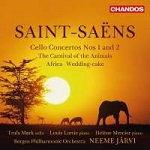 CHAN5162:
If you took my advice to avoid the Beulah reissue of the recording of
Carnival of the Animals with clever-clever narration by Noël
Coward (DL News 2015/11) and are still looking for a good ‘straight’
performance, you may just have found it. I can’t remember a better
performance – and my memory goes back a long way to a performance at
the Proms in the early 1960s. The same applies to the cello concertos:
I first heard the a-minor from Zara Nelsova and Sir Adrian Boult (Ace
of Clubs ACL244, with Lalo) and don’t remember being as pleased as with
later recordings of the work, not least the new Chandos. With very
good recording, especially in 24-bit format, and the Chandos booklet
as part of the bargain, I’m happy in every respect except that I still
don’t see why the 24-bit download costs 40% more and surround-sound
100% more than the 16-bit (£9.99, £13.99 and £19.99 respectively) when
you should be able to find the SACD for £12 or less. Surely it costs
less to offer the download than to produce the 3-layer physical equivalent,
or am I missing something?
CHAN5162:
If you took my advice to avoid the Beulah reissue of the recording of
Carnival of the Animals with clever-clever narration by Noël
Coward (DL News 2015/11) and are still looking for a good ‘straight’
performance, you may just have found it. I can’t remember a better
performance – and my memory goes back a long way to a performance at
the Proms in the early 1960s. The same applies to the cello concertos:
I first heard the a-minor from Zara Nelsova and Sir Adrian Boult (Ace
of Clubs ACL244, with Lalo) and don’t remember being as pleased as with
later recordings of the work, not least the new Chandos. With very
good recording, especially in 24-bit format, and the Chandos booklet
as part of the bargain, I’m happy in every respect except that I still
don’t see why the 24-bit download costs 40% more and surround-sound
100% more than the 16-bit (£9.99, £13.99 and £19.99 respectively) when
you should be able to find the SACD for £12 or less. Surely it costs
less to offer the download than to produce the 3-layer physical equivalent,
or am I missing something?
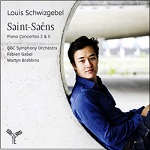 AP112:
Louis Schwizgebel is up against strong competition, either coupled as
here from Jean-Yves Thibaudet and Charles Dutoit (Decca 4758764,
with Fauré and Franck – review)
or from Benjamin Grosvenor and James Judd in No.2 (Decca 4783527,
with Le cygne, Gershwin and Ravel: Recording of the Month
– review
– DL
Roundup September 2012/2). Incidentally, Linn no longer offer Decca
downloads and the Qobuz download of the Grosvenor is over-priced at
£11.56 – you should be able to find the CD for around that price – though
the 24-bit at £15.56 may be worth considering*. For the completist
the Hyperion 2-CD set of all five concertos and shorter works from Stephen
Hough, the CBSO and Sakari Oramo is unbeatable (CDA67331/2: review
– from hyperion-records.co.uk,
mp3 and lossless, with pdf booklet, or CD). The single-CD reissue of
Nos. 2, 4 and 5 on CDA30018 – DL
Roundup October 2010 – seems to be unavailable.
AP112:
Louis Schwizgebel is up against strong competition, either coupled as
here from Jean-Yves Thibaudet and Charles Dutoit (Decca 4758764,
with Fauré and Franck – review)
or from Benjamin Grosvenor and James Judd in No.2 (Decca 4783527,
with Le cygne, Gershwin and Ravel: Recording of the Month
– review
– DL
Roundup September 2012/2). Incidentally, Linn no longer offer Decca
downloads and the Qobuz download of the Grosvenor is over-priced at
£11.56 – you should be able to find the CD for around that price – though
the 24-bit at £15.56 may be worth considering*. For the completist
the Hyperion 2-CD set of all five concertos and shorter works from Stephen
Hough, the CBSO and Sakari Oramo is unbeatable (CDA67331/2: review
– from hyperion-records.co.uk,
mp3 and lossless, with pdf booklet, or CD). The single-CD reissue of
Nos. 2, 4 and 5 on CDA30018 – DL
Roundup October 2010 – seems to be unavailable.
Could Louis Schwizgebel really be as good as Dan Morgan’s Recording
of the Month review
claims? While I was waiting for the new recording to download – it
takes a while in 24-bit format since my provider slowed down my connection
from 16meg to around 9 meg – I listened again to the Hyperion recording
of No.2 and found myself thinking ‘beat that!’ I wouldn’t like to score
them against one another but if I had to I suppose it would be ‘deuce’.
The 24-bit BBC recording is very good, too, though only 24/44.1.
The rival Decca and Hyperion recordings contain more music than the
Aparté but eclassical’s per-second pricing takes care of that: at the
time of writing there’s an added incentive in that 24-bit can be yours
for the same price as mp3 and lossless, $11.52.
* at the time of writing Presto
were offering the CD for £11.75, mp3 for £7.93, 16-bit for £9.91 and
24-bit for £18.15.
Camille SAINT-SAËNS (1835-1921)
Symphony
No. 3 in C minor Organ, Op. 78 (1886) [35:39]
Piano Concerto No 4 in C minor, Op 44 (1875) [25:29]
Daniel Roth (organ), Jean-François Heisser (piano)
Les Siècles/François-Xavier Roth
rec. live, 16 May 2010, Église Saint-Sulpice, Paris (symphony), 16 June
2009, Opéra-Comique, Paris (concerto)
MUSICALES ACTES SUD ASM04 [61:22] – from eclassical.com
(mp3 and lossless, NO booklet)
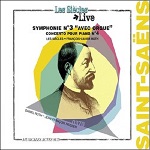 This
recording has been around for a while but I have only just caught up
with it courtesy of John Quinn’s review,
to which I also owe the recording details, there being no booklet with
the download.
This
recording has been around for a while but I have only just caught up
with it courtesy of John Quinn’s review,
to which I also owe the recording details, there being no booklet with
the download.
‘Period’ performances these may be but there’s no lack of fire in them.
There are the two drawbacks which JQ mentions in the form of the very
reverberant acoustic and the dry sound of the 1874 Érard piano but this
would be a very enjoyable recording to add to a collection which contains
more conventional performances of both works.
The download sounds fine; the lack of a booklet is a serious drawback
but it appears from JQ’s comments that it’s not one of the best.
Antonín DVOŘÁK (1841–1904)
Concerto in b minor for cello and orchestra, Op.104 (1894–95) [37:35]
Bohuslav MARTINŮ (1890–1959)
Concerto No.1 for cello and orchestra: third version, H196/III (1930,
rev. 1939, 1955) [24:50]
Christian Poltéra (cello)
Deutsches Symphonie-Orchester Berlin/Thomas Dausgaard
rec. August 2014, Jesus-Christus Kirche, Berlin-Dahlem, Germany. DDD
BIS BIS-CD-2157 [63:18] – from eclassical.com
(mp3, 16- and 24-bit lossless with pdf booklet).
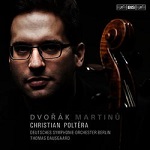 I
recently became reacquainted with a very decent transfer of the classic
1952 Supraphon recording of the Dvorák (Mstislav Rostropvich and Vaclav
Talich, Beulah 1PDR21 with Walton and Haydn – DL
News 2016/1). By contrast with that benchmark Poltéra and Dausgaard
take a more affectionate view of the opening movement, pausing to admire
the scenery at several points where their predecessors keep the music
moving without sacrificing the beauty. At times the mood on BIS becomes
positively languid. The playing is loving and very beautiful; though
I prefer to keep things moving here I was won over. I was surprised
to find that the first movement overall is actually slightly faster
on the new BIS than from Rostropovich and Talich, and considerably faster
than Rostropovich’s later version with Karajan (mid-price DG Originals,
with Tchaikovsky) or another excellent version from Wallfisch and Mackerras
(lower-mid-price Chandos, with Dohnányi).
I
recently became reacquainted with a very decent transfer of the classic
1952 Supraphon recording of the Dvorák (Mstislav Rostropvich and Vaclav
Talich, Beulah 1PDR21 with Walton and Haydn – DL
News 2016/1). By contrast with that benchmark Poltéra and Dausgaard
take a more affectionate view of the opening movement, pausing to admire
the scenery at several points where their predecessors keep the music
moving without sacrificing the beauty. At times the mood on BIS becomes
positively languid. The playing is loving and very beautiful; though
I prefer to keep things moving here I was won over. I was surprised
to find that the first movement overall is actually slightly faster
on the new BIS than from Rostropovich and Talich, and considerably faster
than Rostropovich’s later version with Karajan (mid-price DG Originals,
with Tchaikovsky) or another excellent version from Wallfisch and Mackerras
(lower-mid-price Chandos, with Dohnányi).
In the other two movements Poltéra and Dausgaard keep the music moving
as much as I could desire, without in any way missing any of the affection
in the slow movement, though on paper they might appear to do so at
11:01 – closer to Rostropovich’s tempo with Talich, as against 12:41
in the later recording with Karajan. (Either influenced by Karajan,
or he seems to have taken an increasingly broad view of this movement,
with his EMI/Warner recording with Boult in between the two tempi).
The finale has bags of energy.
I shall return to this new recording, not least because it sounds infinitely
better than the Beulah reissue of the Supraphon, especially in 24-bit,
but also because of the evident affection which soloist and conductor
show for the music.
There’s far less competition in the Martinů, though the outstanding
Supraphon recording (SU39892 – DL
Roundup September 2012/1) offers a formidable comparison. Disregard
the hmvdigital link for the Supraphon; the emusic comes up blank, too:
substitute
this.
With affectionate playing the Martinů sounds almost as approachable
as the Dvorák. If the coupling appeals and you prefer the new BIS recording
to the 1966/1975 Supraphon of the same combination (Chuchro, Neumann
and Košler with the Czech Philharmonic – from emusic.com,
mp3) this could be a good choice – but I’d sample that Dvorák opening
movement first if you can. (I sampled the Chuchro from Qobuz and the
first movement is even more languid, to a fault. With the Czech Phil
apparently playing on auto-pilot, this makes me appreciate the new BIS
much more.) If you want both Martinu concertos and the Concertino,
Chandos CHAN10547 is the place to go: from theclassicalshop.net
(mp3 and lossless, with pdf booklet: NB: good value on mp3 at £4.99
but not as lossless download for £7.99 when the CD is on sale from Chandos
themselves for less and even for as little as £6.50 from other dealers).
Charles Marie WIDOR (1844-1937)
La Nuit de Walpurgis (1887) [26:37]
Violin Concerto (1877, edited by Martin Yates) [24:32]
Symphony No.1, Op.16 (1870) [26:33]
Sergey Levitin (violin)
Royal Scottish National Orchestra/Martin Yates
DUTTON CDLX7315 [77:43] – from emusic.com
(mp3, NO booklet)
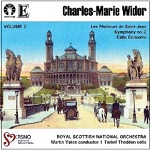
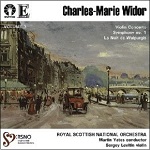 At
first glance you may well mistake this for a recording of organ music:
it is, in fact, one of a pair of CDs which Dutton, with their usual
enterprise, have brought us of Widor’s orchestral works. The other,
featuring interludes from Les Pêcheurs de Saint-Jean, his Cello
Concerto and Symphony No.2, with Thorleif Thedéen (cello), the RSNO
and Martin Yates, is on an earlier release, CDLX7303, also available
from emusic.com.
You might expect the orchestration to be organ-orientated, as César
Franck’s Symphony is often accused of being – unfairly, I think – but
such is not the case. As befits its subject – the witches’ revels on
Walpurgisnacht, famously depicted by Goethe in Faust and
the inspiration for the final movement of Berlioz’s Symphonie Fantastique
– the opening work is very colourful. It was very popular in Widor’s
own lifetime and its restoration in such a fine performance is very
welcome. Each album costs just £4.20: no booklet, but you’ll find some
brief notes on the Dutton
website.
At
first glance you may well mistake this for a recording of organ music:
it is, in fact, one of a pair of CDs which Dutton, with their usual
enterprise, have brought us of Widor’s orchestral works. The other,
featuring interludes from Les Pêcheurs de Saint-Jean, his Cello
Concerto and Symphony No.2, with Thorleif Thedéen (cello), the RSNO
and Martin Yates, is on an earlier release, CDLX7303, also available
from emusic.com.
You might expect the orchestration to be organ-orientated, as César
Franck’s Symphony is often accused of being – unfairly, I think – but
such is not the case. As befits its subject – the witches’ revels on
Walpurgisnacht, famously depicted by Goethe in Faust and
the inspiration for the final movement of Berlioz’s Symphonie Fantastique
– the opening work is very colourful. It was very popular in Widor’s
own lifetime and its restoration in such a fine performance is very
welcome. Each album costs just £4.20: no booklet, but you’ll find some
brief notes on the Dutton
website.
I’m not sure how often I shall choose to listen to it or the other two
works but I doubt if they could be better performed and the recording
sounds very well in the full-bit-rate mp3 in which emusic.com are releasing
all their classical downloads now and catching up with some of the earlier
releases. At the risk of sounding like a broken record, they should
also offer lossless sound and the booklet.
Otto MALLING (1848–1915) Organ Music
The Three Kings: Christmas Mood-Pictures for Organ, Op.84 (1907)*
[30:56]
The Virgin Mary: Mood-Pictures for Organ, Op.70 (1897)* [25:20]
Echoes from the Psalms of David, Op.89 (1910) [12:27]
Sverker Jullander (organ)
rec. Vasa Church, Gothenburg, Sweden, 9-10 November 2010. DDD
Full organ specification included in booklet.
* first recording
TOCCATA CLASSICS TOCC0224 [69:14] – from eclassical.com
(mp3 and lossless, NO booklet).
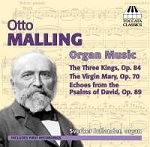 I’m
more than a little overdue in catching up with this 2014 release and
late, too, in writing about it: the first work here was composed for
Epiphany (6 January). No-one else seems to have reviewed the CD for
MWI, though Byzantion thought that Sverker Jullander played with distinction
on an earlier Toccata recording. I’m heavily dependent on the Toccata
publicity material and the authoritative booklet* in writing about Otto
Malling, a central figure in Danish musical life, a composer, conductor,
pianist, organist, administrator and teacher whose substantial output
of organ music took the form of eleven suites of ‘mood pictures’ inspired
by the Bible. The Three Kings opens in languidly romantic manner
but the music also encompasses the fierily epic – with the organ in
what my wife likes to call ‘growly’ mode – in a language which is at
all times dignified and direct. Lovers of Bach’s music will recognise
Wie schön leuchtet der Morgenstern and other seasonal German
music in the background of The Three Kings.
I’m
more than a little overdue in catching up with this 2014 release and
late, too, in writing about it: the first work here was composed for
Epiphany (6 January). No-one else seems to have reviewed the CD for
MWI, though Byzantion thought that Sverker Jullander played with distinction
on an earlier Toccata recording. I’m heavily dependent on the Toccata
publicity material and the authoritative booklet* in writing about Otto
Malling, a central figure in Danish musical life, a composer, conductor,
pianist, organist, administrator and teacher whose substantial output
of organ music took the form of eleven suites of ‘mood pictures’ inspired
by the Bible. The Three Kings opens in languidly romantic manner
but the music also encompasses the fierily epic – with the organ in
what my wife likes to call ‘growly’ mode – in a language which is at
all times dignified and direct. Lovers of Bach’s music will recognise
Wie schön leuchtet der Morgenstern and other seasonal German
music in the background of The Three Kings.
Sverker Jullander, Professor of Musical Performance at Piteå School
of Music, Luleå University of Technology, Sweden, performs on the organ
of the Vasa Church, Gothenburg, built in 1909 by Eskil Lundén (1881–1945)
and ideally suited to North European late-Romantic music. It was rebuilt
in 1943 by Olof Hammarberg under the influence of the Organ Reform movement
and a Ruckpositiv was added in 1952 by the same builder. In 2001–2
the organ was again rebuilt by the firm of Grönlund, Luleå. I very
much enjoyed hearing this music; this remains the only recording of
two of the works and the only one currently available of the third but
I can hardly imagine it being bettered.
* Not included by eclassical but obtainable from toccataclassics.com.
Ottorino RESPIGHI (1879-1936)
Gli Uccelli (The Birds, P154) [18:54]
Il Tramonto (The Sunset, P101)* [15:34]
Trittico Botticelliano (Botticelli Triptych, P151) [18:54]
Antiche Arie e Danze per liuto (Ancient Airs and Dances) Suite
No.1, P109 [13:48]
Isabel Bayrakdarian (soprano)*
Orchestre Symphonique de Laval/Alain Trudel
rec. March 2015, Eglise Saint-Rose-de-Lima, Laval, Quebec, Canada. DDD
Text and translation of Il Tramonto included
ATMA ACD22732 [67:25] – from eclassical.com
(mp3, 16- and 24-bit lossless with pdf booklet).
Subscribers stream from classicsonlinehd.com
(16- and 24-bit with booklet)
La Boutique Fantasque (after Rossini), P120 [45:21]
Gli Uccelli (The Birds, P154) [19:05]
Orchestra Sinfonica del Teatro Massimo di Palermo/Marzio Conti
rec. July 2007, Teatro Massimo di Palermo, Italy. DDD/DSD.
CPO 777295-2 [64:26] – from eclassical.com
(mp3 and lossless with pdf booklet)
Subscribers stream from Qobuz
or classicsonlinehd.com
(both with booklet).
Antiche Danze ed Arie per liuto (Ancient Airs and Dances)
Suite No.1, P109 [14:48]
Suite No.2, P138 [15:45]
Suite No.3, P172 [15:48]
Gli Uccelli (The Birds, P154) [18:22]
Münchener Rundfunkorchester/Henry Raudales
CPO 777233-2 [64:43] – from eclassical.com
(mp3 and lossless: NO booklet), subscribers stream from Naxos
Music Library (with booklet) or classicsonlinehd.com
(NO booklet).
Benchmark recordings:
— La Boutique Fantasque: Decca Eloquence 4800024
OSR/Ansermet (with Pines of Rome and Fountains of Rome)
– review
– OR Somm Céleste SOMM027 (with Stravinsky Petrushka)
– DL
News 2014/4.
— Ancient Airs and Dances Suites 1-3: Mercury
download Philharmonia Hungarica/Antal Doráti – subscribers stream from
Qobuz OR Alto ALC1222 (budget-price CD, with Gli Uccelli).
Amazon
UK have a small number of the Mercury CDs in stock, @ £7.34, at
the time of writing. US purchasers are more in luck: the Mercury CD
is in stock at ArkivMusic.
— Ancient Airs and Dances Suites 1-3: Chandos CHAN9415
Sinfonia 21/Richard Hickox (with Suite for flute and orchestra and Berceuse)
– rec. 1995 [61:51] – from theclassicalshop.net
(mp3 and lossless with pdf booklet)
— Gli Uccelli [19:42] Trittico Botticelliano [18:40];
Il Tramonto [15:44]: Chandos CHAN8913 Bournemouth Sinfonietta/Tamás
Vasary – rec. 1990 [64:19] – from theclassicalshop.net
(mp3 and lossless, with pdf booklet)
— Il Tramonto; Trittico Boticelliano: Collins
Classics CC1349 Janet Baker; City of London Sinfonia/Richard
Hickox (with Aretusa andLauda per la Natività) – download
only: see DL
News 2015/11.
Budget-price Respighi Collections:
— Vetrate da Chiesa (Church Windows); Brazilian Impressions;
Belkis, Queen of Sheba Suite; Metamorphoseon; Roman Trilogy
(Pines, Fountains,Festivals of Rome) Philharmonia
Orchestra/Abbey Simon; Yan-Pascal Tortelier – rec. 1984-1991 Chandos
CHAN241-45 (2-for-1) – from
theclassicalshop.net (mp3 and lossless with pdf booklet). Review
and DL
Roundup January 2012/2.
— Pines of Rome; Fountains of Rome; Belfagor
Overture; Gli Uccelli; Trittico Botticelliano; Ancient
Airs and Dances Suites 1-3 LSO/Lamberto Gardelli; ASMF, LACO/Neville
Marriner EMI Gemini 5865492 (2 CDs, around £8.50). NB:
lossless downloads and even mp3 are likely to cost more than the CDs.
The craziest price must be that from 7digital.com: £18.99 for mp3 and
£27.99 for lossless – three times the price of the CDs! The Marriner
items on CD2 were also included on an EMI 20th-century collection
– Bargain of the Month: review
– now deleted but available for streaming by subscribers to Qobuz.
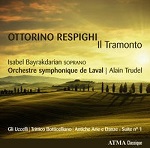 ACD22732:
‘[T]his is a fine addition to the Respighi discography. The playing
is full of atmosphere and energy and the depth of tone in Il Tramonto
belies the fact that this is a chamber orchestra. ATMA’s recording is
absolutely top class. Lovely disc.’ See review
by John Whitmore.
ACD22732:
‘[T]his is a fine addition to the Respighi discography. The playing
is full of atmosphere and energy and the depth of tone in Il Tramonto
belies the fact that this is a chamber orchestra. ATMA’s recording is
absolutely top class. Lovely disc.’ See review
by John Whitmore.
Until now my recommendation for three-quarters of this repertoire would
have been CHAN8913 – see above – that’s still well worth considering
but the new recording adds the first suite from Ancient Airs and
Dances instead of the Adagio con variazioni for cello and
orchestra on the Chandos CD and it comes in 24- as well as 16-bit; not
that the Chandos sounds at all dated, but it might be more attractive
now at a lower price. At £9.99 for the lossless download, it works
out rather more expensive than the 16-bit version of the Atma from eclassical.com
($12.09, with 24-bit at $18.14).
Respighi carries off the trick of making out-of-the-way early music
sound very attractive: none of the music in the three suites is by a
composer of the first rank and much of it is by ‘Ignoto’, the Italian
equivalent of our old friend Anon, but it’s all very enjoyable. The
first Suite receives an attractive performance here but I recommend
supplementing the new Atma with one of the complete recordings discussed
below.
There’s very little to choose between the various recordings of Gli
Uccelli which I have listed – it’s been a popular work ever since
it featured as the signature tune of a BBC TV antiques programme many
years ago. Once again Respighi works his magic on the music of unknown
composers: only La Gallina (The Hen) comes from a fairly well-known
work, Rameau’s keyboard piece La Poule. The new recording treads
particularly delicately, especially in the closing Il Cucu.
Atma bill Il Tramonto as the star item on their recording. Having
rediscovered the Janet Baker Collins recording as a download from emusic.com
– also available for subscribers to stream from classicsonlinehd.com
– that has become my clear benchmark for this beautiful work. It also
contains a fine recording of the Trittico Botticelliano and it’s
very inexpensive, but good as the recording is, it’s no match for the
very good Atma, especially fine in 24-bit garb. Isabel Bayrakdarian
is very impressive – though a soprano, she sounds well at home in this
work for mezzo. She doesn’t quite oust Janet Baker from my affection
but that’s a pretty tall order.
With a very fine recording of the Botticelli-inspired Trittico,
too, if the coupling appeals you should buy the Atma with confidence,
especially if you are seeking 24-bit – at $18.14 it’s not much more
than the 16-bit CD – but do also consider the other recordings listed
above, especially the benchmarks, and those considered below.
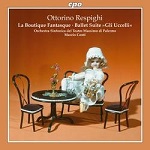
CPO 777295-2: I had thought the classic Ansermet recording of
La Boutique Fantasque unassailable, and it remains my benchmark,
but this CPO recording comes very close. Both it and Gli Uccelli
receive suitably lively performances and sound very well indeed in 24-bit
format.
If you are looking for more modern sound than the Ansermet – very good
as that is for its age – choice of coupling should be your guide in
choosing between this Boutique and the BIS recording by John
Neschling, coupled with Brazilian Impressions (BIS-SACD-2050),
or the Chandos from Gianandrea Noseda, withla Pentola magica
(CHAN10081) – both reviewed in DL
News 2014/4 and both available in 24-bit sound.
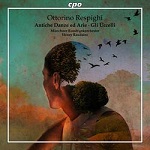 777233-2:
Henry Raudales is better known as a violinist, in which role he has
made a number of recordings for CPO under Ulf Schirmer’s direction,
including a Recording of the Month of music by Wolf-Ferrari
(777567-2 – review).
777233-2:
Henry Raudales is better known as a violinist, in which role he has
made a number of recordings for CPO under Ulf Schirmer’s direction,
including a Recording of the Month of music by Wolf-Ferrari
(777567-2 – review).
The problem with the first Suite of the Ancient Airs on the Atma
recording is that it’s likely to make you want to seek out the other
two suites – not so well known, but very attractive. With the Doráti
recording now download only in the UK – and fairly expensive for a download
at that – the real competition is with Hickox on Chandos. I’m certainly
not about to jettison my copy of the last-but-one reissue of the Doráti
on CD (4343042) but I’m not sure that I’d pay over the odds for
the download. Michael Cookson was also impressed with the 2-CD reissue
of Doráti’s Respighi on Newton – review
– though that also seems to have vanished from the catalogue; he also
praised the now hard to find Mercury reissue – review.
The Munich Radio Orchestra may be a rather larger ensemble than on the
other recordings of the Ancient Airs but Raudales resists the
temptation to make the performance the equivalent of Respighi’s Roman
Trilogy. Those three works have been aptly compared to a Technicolor
movie but the Ancient Airs and The Birds should sound
more like a recently restored renaissance painting with all the delicacy
of the brushwork revealed, as on the Chandos recording listed above,
and that’s the treatment that it receives on this new recording, too.
If you have already bought the earlier CPO recording featuring The
Birds, you may find yourself feeling short-changed by having to
obtain another recording on the same label, especially as there are
so many other very fine recordings of the work. On the other hand the
Doráti CD contains just the Ancient Airs, so you could regard
the CPO filler as a worthwhile bonus.
English Landscapes
Arnold BAX (1883-1953) Tintagel [16:57]
Ralph VAUGHAN WILLIAMS (1872-1958) The Lark Ascending
[15:18]
Gerald FINZI (1901-1956) The Fall of the Leaf [11:08]
Ralph VAUGHAN WILLIAMS (1872-1958) Norfolk Rhapsody No:1 [10:23]
Frederick DELIUS (1862-1934) Summer Night on the River
[6:06]
On Hearing the First Cuckoo in Spring [6:03]
Edward ELGAR (1857-1934) ‘As Torrents in Summer’ (from King
Olaf) [2:11]
John IRELAND (1879-1962) The Hills [2:54]
Lyn Fletcher (violin)
The Hallé Choir
Hallé Orchestra/Sir Mark Elder,
rec. 5-6 November 2005, BBC Studio 7, New Broadcasting House, Manchester.
DDD
HALLÉ CDHLL7512 [71:40] – from emusic.com
(mp3, NO booklet)
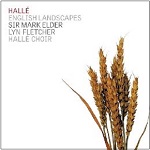 This
is a rare disappointment from this source. Having downloaded the album
I settled down last thing in the evening expecting to be entranced,
yet something didn’t quite gel: even the two Delius pieces seemed slightly
lacking in their accustomed magic. At first I thought that either I
was not in the right mood or that the emusic transfer was not doing
the music justice – mp3 at around 230kb/s, so well short of the ideal
320kb/s let alone lossless. I was even more surprised when I saw that
the Finzi had been made first choice by Radio 3 Building a Library in
December 2006.
This
is a rare disappointment from this source. Having downloaded the album
I settled down last thing in the evening expecting to be entranced,
yet something didn’t quite gel: even the two Delius pieces seemed slightly
lacking in their accustomed magic. At first I thought that either I
was not in the right mood or that the emusic transfer was not doing
the music justice – mp3 at around 230kb/s, so well short of the ideal
320kb/s let alone lossless. I was even more surprised when I saw that
the Finzi had been made first choice by Radio 3 Building a Library in
December 2006.
Then I read Em Marshall’s review and found a similar response there,
with such phrases as ‘a little lacking in ethereal beauty’ and ‘lacking
the emotional clout needed’. Andrew Achenbach, too, in Gramophone,
summed up his – and my – feelings with ‘The head leads the heart’.
So that’s three of us who feel somewhat lukewarm about what I had hoped
to be praising to the skies. Stay with Beecham for the two Delius pieces
(EMI/Warner 9099152, 6 CDs, super-budget, or Beulah: Summer
Night 9PD82
– see 2016/1).
Lest it be thought that I like only Beecham’s Delius, I recommended
recordings by David Lloyd-Jones (Naxos), Richard Hickox (EMI) and William
Boughton (Nimbus) alongside the single-CD EMI Great Recordings Beecham
in May
2010. A little updating on availability is in order. The EMI/Hickox
can be streamed
by Qobuz subscribers but the download is hardly competitive at £9.09:
much better value is their price of £5.97 for the budget 2-CD EMI Essential
Delius –
stream – but even there hmvdigital.com
offer better value if you’re happy with mp3, at £4.49. (Various conductors,
including Barbirolli, Beecham, Handley and Hickox – DL
Roundup May 2012/2.)
The single-CD Beecham costs £7.49 in mp3 from hmvdigital.com
or 7digital.com,
but the 6-CD edition offers better value on disc or as a download.
The Boughton/Nimbus, with music by Vaughan Williams and Delius, comes
in mp3 from
7digital.com or hmvdigital.com:
£8.49 in each case, but you may prefer to order the CD for not much
more from MusicWeb-International.
For the Naxos please see below.
Perhaps now would be a good time to recap on some recommendations of
key recordings of Delius. Several of these come from Chandos and I
have had reason to revisit them recently because I had previously downloaded
them in wma format, just about the only format which the Sony Walkman
cannot play. One solution is to import them into iTunes which will
automatically convert them to wav files. Any purchased from theclassicashop.net
will remain in your account and can be downloaded again in flac format,
but the MusicWeb-International press account was recently changed, so
I had to come again for some of them and found several of them to be
slightly less expensive as lossless downloads from eclassical.com –
especially advantageous for US$ purchasers – Qobuz and classicsonlinehd.com:
both the latter charge £7.99 for 16-bit lossless, as against £9.99 from
theclassicalshop.net. On the other hand, if you want 24-bit sound you
need to turn to theclassicalshop.net.
A good place to start would be with one or other of two albums entitled
The Essential Delius. I’ve mentioned the EMI version above.
The Chandos is slightly more expensive, a two-for-one offering containing
the Florida Suite, On hearing the first Cuckoo and North
Country Sketches (CD1, conducted by Vernon Handley) with shorter
pieces on CD2 conducted by Richard Hickox, including Summer Night
on the River,A Song before Sunrise and In a Summer Garden.
(CHAN241-37 [145:55] – from theclassicalshop.net
(mp3 £7.99 and lossless £9.99 with pdf booklet).)
The contents of CD1 remain available separately as CHAN6628 –
from
theclassicalshop.net or CHAN8413 – from theclassicalshop.net.
Both come at super-budget price: £4.80 for mp3 and £4.99 for lossless,
both with pdf booklet. NB: at £7.99 and with no booklet, classicsonlinehd.com
is too expensive here, but worth streaming
for subscribers.
From being something of an orphan the Florida Suite has become
one of Delius’s most-recorded works. The wonderful performance from
which I got to know and love the work, with Sir Thomas Beecham at the
helm, is now available only as part of the 6-CD set mentioned above:
excellent value, but equally desirable on the Beulah collection (3PDR4:
Recording of the Month – 2015/11).
As well as the Beecham and Handley recordings there is a recommendable
inexpensive version on Naxos: Florida Suite, Over the hills
and far away, Idylle Printemps, La Quadroone, Scherzo
and Koanga: Final Scene (8.553535: English Northern Philharmonia/David
Lloyd-Jones – DL
Roundup May 2010). Subscribers stream
or purchase
from classicsonline.com with pdf booklet (16-bit £4.99, 24-bit £9.99).
Another fine coupling of Florida and North Country Sketches,
with other works, is available from Decca in performances conducted
by Sir Charles Mackerras, either on Double Decca or Decca British Music,
both now available only as special pressings from Presto
or as downloads, also obtainable from Presto. Though slightly more
expensive than the Essential Delius collections, either of these
would make a good introduction to the composer: inconveniently, these
two Decca sets are not identical but duplicate most of the items.
The British Music set contains a fine recording of Appalachia,
another Delius work which I got to know from Beecham, this time in less
than ideal mono on a Philips LP (ex-American Columbia). I discussed
this along with a then new Chandos recording from Sir Andrew Davis and
an accomplished team in
April 2011/1. I made the Chandos a Download of the Month
but it doesn’t efface memories of the Beecham. (CHSA5088 with
Song of the High Hills – from theclassicalshop.net,
mp3, 16- and 24-bit lossless with pdf booklet or SACD). The 16-bit
comes a little less expensively from classicsonlinehd.com
(£7.99) or eclassical.com
($11.54), both with pdf booklet, but theclassicalshop.net is your only
port of call for 24-bit in all cases.
The three string concertos – for violin-and-cello, violin and cello
come in very fine performances from Tasmin Little and Paul Watkins,
again with Sir Andrew Davis directing, on CHSA5094 (from theclassicalshop.net,
mp3, 16- and 24-bit lossless with pdf booklet or SACD). Here too a
small but significant saving is available from eclassical.com
($12.32) or classicsonlinehd.com
(£7.99) but again 24-bit is the preserve of theclassicalshop.com only.
That’s another Download of the Month – October
2011/1. Tasmin Little’s earlier recording of the Violin Concerto,
with Sir Charles Mackerras which I mentioned there, well worth having
for the Piano Concerto, too, is now available only as a Presto
special CD or download.
The Decca Mackerras album also includes a fine performance of the Piano
Concerto with Jean-Rodolphe Kars as soloist but Chandos again have
the most modern recording, of the original 1897 version, from Howard
Shelley and Sir Andrew Davis, with Paris – Song of a great City,
Brigg Fair and Idylle printemps (CHAN10742 – from
theclassicalshop.net,
mp3, 16- and 24-bit lossless with pdf booklet – review).
Those in search of a bargain should be happy with Piers Lane, the RLPO
and Vernon Handley on Classics for Pleasure, with the beautiful Finzi
Eclogue and Vaughan Williams Piano Concerto ( 5759832,
around £5.50 on CD: it’s unlikely that you will find a download costing
less).
Yet another excellent version of the Piano Concerto (1904 version)
was one of my Top
30 Hyperion choices: CDA67296, Piers Lane again, with the
Ulster Orchestra and David Lloyd-Jones, with Ireland Legend and
Piano Concerto – from hyperion-records.co.uk
(mp3 and lossless with pdf booklet).
Mostly rarer repertoire can be found on another Chandos/Davis offering,
this time with the Bergen orchestra in music by Delius with Norwegian
associations, including Paa vidderne and Eventyr (CHAN5131
– from theclassicalshop.net,
mp3, 16- and 24-bit lossless with pdf booklet and on SACD as CHSA5131:
DL
News 2013/18).
Having been disappointed with the Hallé recording which started all
this off, I am delighted to be able to report much better things of
another album from the same source: on English Spring Arnold
Bax’s Spring Fire is coupled with Frank Bridge’s Enter Spring
and Delius’s Idylle de printemps and The March of Spring,
the last of the North Country Sketches. (CDHLL7528: Recording
of the Month – review
–
review – DL
Roundup August 2011/1: Download of the Month). The
classicsonline.com link no longer applies and the download seems not
to be available from its replacement classicsonlinehd.com, though subscribers
to the sister site Naxos Music Library can stream it there.
Igor STRAVINSKY (1882-1971)
Rite of Spring (1913, rev. 1947 version)
MusicAeterna/Teodor Currentzis
rec. 7-9 October 2013, Stollberger Straße, Cologne. DDD.
SONY CLASSICAL 88875061412 [34:37] - subscribers stream from
Qobuz,
with pdf booklet.
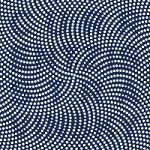 Marc
Bridle seems to have been so upset by aspects of this recording that
he failed to note in his review
that it employs the 1947 revision, not the 1913 original, and that,
pace his ‘location not specified’', that is given at the
end of the booklet. He's far from alone in rating it much less than
ideal: others agree with his dislike, but one magazine made it the ‘unbeatable’
version and the orchestral Recording of the Month and another an Editor's
Choice, both of which I find inexplicable. I expected to loathe it or
love it but in the end I did neither. Apart from some odd pulled-around
tempi and the pretentious poem in the booklet, I found it overall pretty
unexceptional. By comparison with the knock-out Minneapolis/Doráti
- see below - it seems fairly small beer to me.
Marc
Bridle seems to have been so upset by aspects of this recording that
he failed to note in his review
that it employs the 1947 revision, not the 1913 original, and that,
pace his ‘location not specified’', that is given at the
end of the booklet. He's far from alone in rating it much less than
ideal: others agree with his dislike, but one magazine made it the ‘unbeatable’
version and the orchestral Recording of the Month and another an Editor's
Choice, both of which I find inexplicable. I expected to loathe it or
love it but in the end I did neither. Apart from some odd pulled-around
tempi and the pretentious poem in the booklet, I found it overall pretty
unexceptional. By comparison with the knock-out Minneapolis/Doráti
- see below - it seems fairly small beer to me.
I've given the link for streaming from Qobuz but their download price
of £10.29* is too much: almost what you could expect to pay for
the CD. In any format this Sony recording is extremely poor value: the
last time I had a recording which just offered the Rite was the
Fontana LP reissue of the Antal Doráti 1960 Mercury searing performance
(SFL14009) - still one of my favourite recordings - and that was at
budget price**. (Still available, with Petrushka and Etudes,
on a Presto
special CD and as a download, 4343312. Also, less expensively,
in a good transfer, on Beulah Russian Masters 5, with Shostakovich
Quartet No.8 and Symphony No.9, 5PD11 - DL
News 2014/9).
* They are not alone in asking far too much for less than half the music
that is usually fitted on a CD.
** Actually even shorter than the new Sony, at just under 30 minutes,
but good value then at 12/6 (£0.63).
Discovery of the Month
The Romantic Piano Concerto 67
Ludomir RÓŻYCKI (1883-1953)
Ballade in G, Op.18 (1904) [10:35]
Piano Concerto No. 1 in g minor, Op.43 (1917/18) [31:43]
Piano Concerto No.2 (1941/42) [20:52]
Jonathan Plowright (piano)
BBC Scottish Symphony Orchestra/Lukasz Borowicz
rec. City Halls, Candleriggs, Glasgow, 22-23 August 2014. DDD
HYPERION CDA68066 [63:09] – from hyperion-records.co.uk
(mp3, 16- and 24-bit lossless, with pdf booklet, or CD).
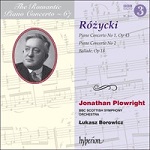 Ludomir
Różycki is not exactly a household name: one of the very few other
recordings of his music – some of them vintage transfers – also comes
from the ever-enterprising Hyperion stable: his String Quartet with
Szymanowski (CDA67684 – review
–
review – DL
News 2013/14).
Ludomir
Różycki is not exactly a household name: one of the very few other
recordings of his music – some of them vintage transfers – also comes
from the ever-enterprising Hyperion stable: his String Quartet with
Szymanowski (CDA67684 – review
–
review – DL
News 2013/14).
Jonathan Plowright and Lukasz Borowicz, ably abetted by the BBC Scottish
Orchestra and the recording engineers, work the sort of magic associated
with Sir Thomas Beecham in making the good second-rate sound first-rate:
these are attractive performances of three works which span four decades
but which all qualify as late-romantic, even the two concertos dating
from the two World Wars. It seems hardly credible that such optimistic
music as the second concerto could have been written when Rózycki’s
native Poland was under Nazi occupation. The second movement of Concerto
No.1 is available as a free download or as part of the free Hyperion
monthly sampler, HYP201602.
Try it at your peril – it’s very moreish, as is the whole album.
Bohuslav MARTINŮ (1890–1959)
Suites from Špalíček, H214 (Chapbook or Story-book)
Opera-ballet in three acts (1931–32, revised 1937 and 1940)
Suite No.1, H214A* [22:29]
Suite No.2, H214B* [22:24]
Rhapsody-Concerto for viola and orchestra, H337 (1952) [19:41]
Liidia Ilves (piano)*
Mikhail Zemtsov (viola)†
Estonian National Symphony Orchestra/Neeme Järvi
CHANDOS CHAN10885 [64:55] – from theclassicalshop.net
(mp3, 16- and 24-bit lossless with pdf booklet)
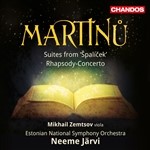 The
current catalogue contains one recording of the complete Špalíček
(Supraphon SU39252), one recording of The Magic Satchel
from Suite No.2, and this new recording of the two substantial suites.
That’s all, folks. At the risk of incurring the criticism of those
who contact the Message Board to say that reviewers should know everything,
I must admit that, though I know and love a great deal of Martinů’s
music, Špalíček is new to me.
The
current catalogue contains one recording of the complete Špalíček
(Supraphon SU39252), one recording of The Magic Satchel
from Suite No.2, and this new recording of the two substantial suites.
That’s all, folks. At the risk of incurring the criticism of those
who contact the Message Board to say that reviewers should know everything,
I must admit that, though I know and love a great deal of Martinů’s
music, Špalíček is new to me.
Like most of Martinů’s music Spalícek can be angular at
times but no more so than, say, Stravinsky’s music of the time and with
a similar redeeming jauntiness. The themes of the original opera-ballet
are taken from folk stories and fairy tales such as Puss in Boots
and Cinderella, both of which feature in the first suite. I
found much to enjoy, for which the performance and recording must take
as much credit as the music itself.
The Rhapsody-Concerto is better known and has a number of recordings
to its credit. Among these I’ve taken Josef Suk with the Czech PO and
Vaclav Neumann (with Violin Concertos Nos. 1 and 2: Supraphon 1119692
or SU39672) and Bohuslav Matoušek with the Czech Philharmonic
Orchestra and Christopher Hogwood (with first and second versions of
Suite concertante: Hyperion CDA67673: download from hyperion-records.co.uk,
mp3 and lossless, with pdf booklet – review)*
as my benchmarks. The new Chandos recording can stand comparison with
either in terms of performance or sound quality (especially 24-bit)
so this is likely to be one of the albums that I turn to when inclined
to listen to Martinů.
I shall not, however, wish to be without the other two for the sake
of the couplings: this may well be one of those occasions when you end
up with three versions of a particular work for that reason. You could
find yourself with three versions of much less attractive music than
the likeable Rhapsody-Concerto. Press me to choose one, however,
and it would have to be Suk: it just sounds slightly more rhapsodic
– subscribers
can stream from Qobuz: download there for £7.99 in lossless sound.
There’s no SACD equivalent, so downloading is the only way to obtain
24-bit sound but I still query why it has to cost so much more (£13.99)
than the 16-bit when hybrid SACDs come at the same price as regular
CDs despite the (presumably) higher cost of manufacture.
There are several very fine choices for the Martinů symphonies:
— Symphonies Nos. 1 and 2: BIS-CD-362 Bamberg SO/Neeme Järvi
– from eclassical.com
(mp3 and lossless with pdf booklet)
— Symphony No.1; Double Concerto for strings piano and timpani:
Chandos CHAN8950 Czech Philharmonic/Jirí Belohlávek – from theclassicalshop.net
(mp3 and lossless with pdf booklet)
— Symphonies Nos. 3 and 4: BIS-CD-363 Bamberg SO/Neeme Järvi
– from eclassical.com
(mp3 and lossless with pdf booklet)
OR (3 and 4) Czech Philharmonic/ Jirí Belohlávek Supraphon SU36312
– review
— Symphony No.4; Memorial to Lidice; Field Mass: Chandos CHAN9138
Czech Philharmonic Choir and Orchestra/Jirí Belohlávek – from theclassicalshop.net
(mp3 and lossless with pdf booklet)
— Symphonies Nos. 5 and 6: BIS-CD-364 Bamberg SO/Neeme Järvi –
from
eclassical.com (mp3 and lossless with pdf booklet). BIS recordings
reviewed
and reviewed
as a complete set.
OR (5 and 6) Czech Philharmonic/Jirí Belohlávek Supraphon SU40072
– review.
— Symphony No.6: Chandos CHAN8897 Czech Philharmonic/Jirí
Belohlávek (with JANÁCEK and SUK) – from theclassicalshop.net
(mp3 and lossless with pdf booklet). See DL
Roundup October 2010.
— Symphony No.6; Bouquet of Flowers: Supraphon Czech Philharmonic/Karel
Ancerl
— Symphonies Nos. 1-6: Onyx ONYX4061 (3 CDs) BBC SO/Jirí
Belohlávek – review.
From
emusic.com (mp3, NO booklet). Subscribers stream from Naxos
Music Library
OR (1-6) Chandos CHAN9103 (3CDs) Royal Scottish National Orchestra/Bryden
Thomsom – from theclassicalshop.net
(mp3 and lossless with pdf booklet). Also available separately.
The BIS recordings also come as a box set (BIS1371/72 – from
eclassical.com)
but at no significant price reduction as downloads – these are inexpensive
in any case at around $9 each – and in an inexpensive Brilliant Classics
box on disc (8950).
* To resolve the query raised in that review: this recording was licensed
by Hyperion from Supraphon.
Bohuslav MARTINŮ
Concertino for Piano Trio and String Orchestra, H232 (1933) [19:04]
Concerto for Piano Trio and String Orchestra, H231 (1933) [23:04]
Partita (Suite No.1) for string orchestra, H212 (1931) [11:35]
Storioni Trio;
Georgisches Kammerorchester Ingolstadt/Ruben Gazarian
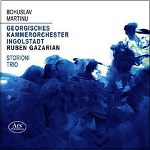 ARS
PRODUKTION ARS38191 [53:43] – from eclassical.com
(mp3 and lossless, with pdf booklet).
ARS
PRODUKTION ARS38191 [53:43] – from eclassical.com
(mp3 and lossless, with pdf booklet).
There are not too many recordings of either the Concerto or Concertino
and only one other which couples them: Trio Wanderer and Gürzenich Orchester/James
Conlon (Capriccio C71053, with Rhapsody-Concerto). I
haven’t heard that but I doubt if it captures the spirit of the music
better. As in Špalíček the music is a trifle
angular but the jauntiness compensates and it’s as approachable as Stravinsky’s
neo-classical works.
Though there is a hybrid SACD, the download is 16-bit only, though none
the worse for that: it’s bright and immediate, as suits the music.
Bohuslav MARTINŮ
String Trio No.1, H136 (first recording) [18:31]
Fêtes Nocturnes (Musique de Chambre No.1), H376 [19:37]
Piano Quartet No.1, H287 [23:48]
String Quintet, H164 [19:08]
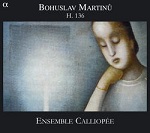 Ensemble
Calliopée, Karine Lethiec
Ensemble
Calliopée, Karine Lethiec
Released in 2009.
ALPHA 143 [81:04] – from eclassical.com
(mp3 and lossless, NO booklet)
There is still only one other recording of the long-lost String Trio.
I haven’t heard it but I doubt that it rivals this very fine collection,
very persuasively performed and very well recorded. On CD this set
runs to two short-value discs but comes with a bonus DVD which I cannot
imagine is a great loss. The lack of the booklet is, however, much
to be regretted: even Naxos
Music Library, who usually oblige in such matters, don’t offer it.
Pierre BOULEZ (1925-2016)
Pli selon pli [69:24]
Christine Schäfer (soprano)
Ensemble InterContemporain/Pierre Boulez
DG 20/21 E4713442 [69:24] – from prestoclassical.co.uk
(mp3 and lossless, with pdf booklet) or stream from Qobuz
(for subscribers, NO booklet).
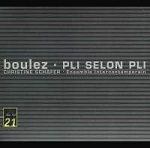 Last
month I tried, not very successfully, to come to terms with Boulez’s
Le Marteau sans Maître. This month I have been wrestling, not
much more successfully, with that other bête noire, Pli selon
pli. I still find myself agreeing with only the first half of the
comment attributed to Stravinsky, that it’s pretty monotonous and monotonously
pretty. This DG recording is the definitive version of the final score
but, though I thought that Boulez had mellowed in his final recording
of Le Marteau, I didn’t find any such compensation here. I can
appreciate how Boulez’s music takes us just one step beyond his teacher
Messiaen – the ‘detonator’ who caused him to ‘explode’ as he put it
– but the problem is that while I can take even Messiaen’s more ‘advanced’
works I can’t make the step further to Boulez. The closest I can come
to indicating a bridge between the two composers is Boulez’s Rituel,
the composer’s last recording of which comes in the 13-CD DG box set
of his music (4806828, now download only) which also includes
Pli selon pli in the performance listed above. His earlier Sony
recording with Éclat-Multiples is available from
Sainsburys in mp3 for £6.99.
Last
month I tried, not very successfully, to come to terms with Boulez’s
Le Marteau sans Maître. This month I have been wrestling, not
much more successfully, with that other bête noire, Pli selon
pli. I still find myself agreeing with only the first half of the
comment attributed to Stravinsky, that it’s pretty monotonous and monotonously
pretty. This DG recording is the definitive version of the final score
but, though I thought that Boulez had mellowed in his final recording
of Le Marteau, I didn’t find any such compensation here. I can
appreciate how Boulez’s music takes us just one step beyond his teacher
Messiaen – the ‘detonator’ who caused him to ‘explode’ as he put it
– but the problem is that while I can take even Messiaen’s more ‘advanced’
works I can’t make the step further to Boulez. The closest I can come
to indicating a bridge between the two composers is Boulez’s Rituel,
the composer’s last recording of which comes in the 13-CD DG box set
of his music (4806828, now download only) which also includes
Pli selon pli in the performance listed above. His earlier Sony
recording with Éclat-Multiples is available from
Sainsburys in mp3 for £6.99.
I’ve given the link for streaming from Qobuz but can’t recommend downloading
from there: you should be able to find the CD for less.
Boulez conducting Messiaen is a different matter altogether:
Olivier MESSIAEN (1908-1992)
Chronochromie [23:57]
La Ville d’en haut [9:20]
Et exspecto resurrectionem mortuorum [24:26]
Cleveland Orchestra/Pierre Boulez
rec. c.1994. DDD.
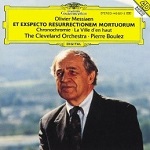 DG
4458272 [57:43] No CD: download from prestoclassical.co.uk
(mp3 and lossless). Stream from Qobuz
(for subscribers). NO booklet from either. Also included in 10-CD
set 4790114.
DG
4458272 [57:43] No CD: download from prestoclassical.co.uk
(mp3 and lossless). Stream from Qobuz
(for subscribers). NO booklet from either. Also included in 10-CD
set 4790114.
If I were recommending just one recording of Messiaen to someone who
knew only the great Turangalîla Symphony, I might well go for
this: the Cleveland Orchestra cannot have been at all familiar with
the music but with Boulez’s guidance they play splendidly. The recording
now comes as a download only, without booklet and by no means inexpensively:
the Presto costs £8.89 for mp3, £11.11 for lossless, which is less than
Qobuz’s £11.56 and 7digital’s £12.99. The Passionato link which I gave
in September
2011/1 is no longer valid.
William ALWYN (1905-1985)
Alwyn conducts Alwyn
Overture, Derby Day (1960) [6:38]
Symphonic Prelude, The Magic Island (1952) [10:15]
Four Elizabethan Dances (from the set of six, 1957) [12:28]
Sinfonietta for Strings (1970) [26:24]
Festival March (1950) [8:20]
London Philharmonic Orchestra/William Alwyn
First released 1972, 1975, 1979 and 1989.
LYRITA SRCD.229 [64:06] – from emusic.com
(mp3, NO booklet)
Autumn Legend for cor anglais and string orchestra (1954) [11:51]
Pastoral Fantasia for viola and string orchestra (1939) [13:00]
Tragic Interlude for 2 horns, timpani and string orchestra [8:16]
Lyra Angelica: Concerto for Harp and String Orchestra (1954)
[30:25]
Nicholas Daniel (cor anglais), Rachel Masters (harp), Stephen Tees (viola)
City of London Sinfonia/Richard Hickox
Rec. St Jude on the Hill, Hampstead, London, 13-14 June 1991. DDD
CHANDOS CHAN9065 [63:51] – from theclassicalshop.net
(mp3 and lossless with pdf booklet)
Violin Concerto (1937-1939) [36:57]
Miss Julie Suite (arranged by Philip Lane) [17:28
Fanfare for a Joyful Occasion (1948) [3:54]
Lorraine McAslan (violin)
Royal Liverpool Philharmonic Orchestra/David Lloyd-Jones
rec. Liverpool Philharmonic Hall, Liverpool, 5 January, 23 June 2010
NAXOS 8.570705 [58:19] – stream (for subscribers) from classicsonlinehd.com.
Download from classicsonlinehd.com
or eclassical.com
(both in 16- and 24-bit formats with pdf booklet).
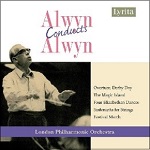 SRCD.229:
Lyrita have done very well by William Alwyn: I think I have all their
other releases of his music: on CD, obtained when they had only one
outlet, in London, or as downloads, so I was pleased to be able to complete
the set. Stephen Francis Vasta had some doubts about the quality of
these shorter pieces as against the symphonies and about Alwyn’s own
conducting – review
– but Colin Clarke was much more enthusiastic about an ‘excellent disc’
– review.
I yield to none in my admiration for the symphonies but I also very
much enjoyed this collection of shorter pieces.
SRCD.229:
Lyrita have done very well by William Alwyn: I think I have all their
other releases of his music: on CD, obtained when they had only one
outlet, in London, or as downloads, so I was pleased to be able to complete
the set. Stephen Francis Vasta had some doubts about the quality of
these shorter pieces as against the symphonies and about Alwyn’s own
conducting – review
– but Colin Clarke was much more enthusiastic about an ‘excellent disc’
– review.
I yield to none in my admiration for the symphonies but I also very
much enjoyed this collection of shorter pieces.
This is one of the older downloads which emusic.com have recently refurbished
at the full 320kb/s bit-rate and it sounds well. Subscribers can obtain
it for £4.20 or less, albeit without the booklet which is, however,
available to all comers from theclassicalshop.net,
where the music can be downloaded, more expensively, in 16-bit lossless.
Sloppily, however, emusic have not renumbered the tracks 1-9 as 01 to
09, so track 10 plays between track 1 and track 2. Renumber with care
in Windows Explorer or the Mac equivalent, having backed up the tracks
first.
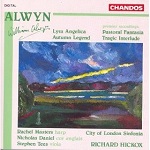 CHAN9065:
Chandos, too, have been keen advocates of Alwyn’s music, with a complete
set of the symphonies from Richard Hickox to rival the Lyrita recordings,
and with three volumes of the film music CHAN9243 and CHAN9959
– both also included on Chandos Film Music 1 on CHUSB0003
– and CHAN10349 – also included in Chandos Film Music 2
on CHUSB0004
– see DL
News 2015/5.
CHAN9065:
Chandos, too, have been keen advocates of Alwyn’s music, with a complete
set of the symphonies from Richard Hickox to rival the Lyrita recordings,
and with three volumes of the film music CHAN9243 and CHAN9959
– both also included on Chandos Film Music 1 on CHUSB0003
– and CHAN10349 – also included in Chandos Film Music 2
on CHUSB0004
– see DL
News 2015/5.
Some of Alwyn’s music can be tough going but the harp concerto Lyra
Angelica, as befits its name, is one of the most beautiful works
composed in the 20th century and it receives an excellent
performance and recording.
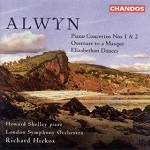 Lyrita
offer only four of the six Elizabethan Dances; the complete set
comes with the Chandos recording of the two Piano Concertos and
Overture to a Masque (CHAN9935 [75:37] – from theclassicalshop.net,
mp3 and lossless with pdf booklet – review
of original separate releases). That’s well worth having as one of
only two recordings of both concertos in fine performances from Howard
Shelley (piano) with the LSO and Richard Hickox. The coupling is slightly
more generous than the Naxos alternative, with Peter Donohoe (piano),
the Bournemouth Symphony Orchestra and James Judd, though the budget
price of the Naxos compensates. (8.557590 with Derby Day
and Sonata alla toccata – subscribers stream from
classicsonlinehd.com, download for £4.99 from
classicsonlinehd.com, 16-bit lossless
Lyrita
offer only four of the six Elizabethan Dances; the complete set
comes with the Chandos recording of the two Piano Concertos and
Overture to a Masque (CHAN9935 [75:37] – from theclassicalshop.net,
mp3 and lossless with pdf booklet – review
of original separate releases). That’s well worth having as one of
only two recordings of both concertos in fine performances from Howard
Shelley (piano) with the LSO and Richard Hickox. The coupling is slightly
more generous than the Naxos alternative, with Peter Donohoe (piano),
the Bournemouth Symphony Orchestra and James Judd, though the budget
price of the Naxos compensates. (8.557590 with Derby Day
and Sonata alla toccata – subscribers stream from
classicsonlinehd.com, download for £4.99 from
classicsonlinehd.com, 16-bit lossless 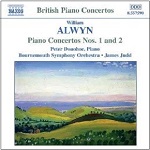 with
pdf booklet. Review
– review).
with
pdf booklet. Review
– review).
NAXOS 8.570705: Naxos is the third member of the triumvirate
who have done well by Alwyn – one whose constituent parts I hope lasts
longer than either of the triumvirates of ancient Rome. John France
welcomed the recording, though with some reservations about whether
the Violin Concerto really justified its considerable length – review:
I think it does.
Both classicsonlinehd.com and eclassical.com offer the download in 16-
and 24-bit formats: COL is the less expensive for the former (£4.99)
but honours are about even for the 24-bit (£9.99 as against $10.75).
Both include the pdf booklet.
Mieczyslaw WEINBERG (1919-1996)
Concertino for Violin and String Orchestra, Op.42 [20:22]
Rhapsody on Moldavian Themes, Op.47/3 (arr. Ewelina Nowicka) [11:16]
Symphony No.10 for String Orchestra, Op. 98 [37:30]
Ewelina Nowicka (violin)
Amadeus Chamber Orchestra of Polish Radio/Agnieszka Duczmal, Anna Duczmal-Mróz
(symphony)
rec. Posen, Polen, Adam Mickiewicz University Hall, Posen, 8 February
2012, 18 January 2013 (symphony)
CPO 7778872 [69:11] – from eclassical.com
(mp3 and lossless, with pdf booklet)
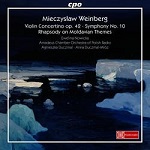 ‘This latest release in CPO’s Weinberg series, makes a further compelling
case for this Soviet composer, who is undergoing a justifiable major
rehabilitation by the record companies, after a long period in the wilderness’.
See review
by Stephen Greenbank.
‘This latest release in CPO’s Weinberg series, makes a further compelling
case for this Soviet composer, who is undergoing a justifiable major
rehabilitation by the record companies, after a long period in the wilderness’.
See review
by Stephen Greenbank.
‘[T]his eminently accessible CPO release … makes a splendid case for
Weinberg’. See review
by Michael Cookson.
All that I need add is that the Concertino contains some of the
most ethereally beautiful music that I’ve heard, without being in any
way facile or superficial. The eclassical download is very good. The
alternative recording of the Concertino from the Kremerata Baltica
(ECM 2368/694810669) – review
–
review – can be downloaded from Qobuz
(16- and 24-bit) but is not available for streaming. It’s also available
in variable-rate mp3 from emusic.com
but at £6.30 and with no booklet, that’s almost as much as the superior
16-bit lossless from Qobuz, which also comes with booklet. The symphony
is a somewhat tougher nut but one that’s well worth cracking.
Light Music/Nostalgia Bargain
Puttin’ on the Ritz
Irving BERLIN: Puttin’ on the Ritz (1929)
Jack YELLEN and Milton AGER: Happy Feet
H. BARRIS: It must be true
YELLEN, SILVERS, DOUGHERTY: Let’s Get Friendly
MOLL, DOWNLING, HANLEY: Honeymoon Lane
KEYES, ERDMAN, RUSSO: Toot, Toot, Tootsie!
Jimmy KENNEDY: Roll along Covered Wagon
GOTTLER and MEISEL: Oh! What a Night
GILBERT and NICHOLLS: Horatio Nicholls’ Californian
Serenade
DJ La ROCCA: Tiger Rag
Ted SBYDER: The Sheik of Araby
RAZAF, WALLER and BROOKS: Ain’t Misbehavin’
YELLEN and SHAPIRO: Loving You
WARREN and DUBIN: She’s a Latin from Manhattan
The Palm Court Theatre Orchestra/Anthony Godwin
rec. c.1986. DDD.
CHANDOS COLLECT CHAN6674 [56:43] – from theclassicalshop.net
(mp3 and lossless with pdf booklet)
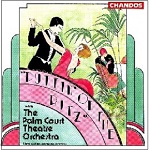 Guild
are doing a wonderful job in transferring vintage recordings of light
music from 78s, mono and stereo LPs, available inexpensively as downloads
from theclassicalshop.net*, but The Palm Court Theatre Orchestra give
us those old favourites, here mostly dating from the 1930s, in authentic
style and in modern digital sound. At £4.80 (mp3) or £4.99 (lossless)**,
too, this album is even more inexpensive than the Guild Light Music
downloads. The cover of this Collect reissue may not be much to look
at but you can also obtain the original booklet with Art Deco cover,
which I’ve used for the thumbnail: CHAN8703 – just follow the
link
but don’t pay extra for the same recording just for the sake of the
cover. Chandos’s claim ‘originally recorded in 1990’ is naughty: this
recording was released on LP and cassette in 1986.
Guild
are doing a wonderful job in transferring vintage recordings of light
music from 78s, mono and stereo LPs, available inexpensively as downloads
from theclassicalshop.net*, but The Palm Court Theatre Orchestra give
us those old favourites, here mostly dating from the 1930s, in authentic
style and in modern digital sound. At £4.80 (mp3) or £4.99 (lossless)**,
too, this album is even more inexpensive than the Guild Light Music
downloads. The cover of this Collect reissue may not be much to look
at but you can also obtain the original booklet with Art Deco cover,
which I’ve used for the thumbnail: CHAN8703 – just follow the
link
but don’t pay extra for the same recording just for the sake of the
cover. Chandos’s claim ‘originally recorded in 1990’ is naughty: this
recording was released on LP and cassette in 1986.
I’ve already recommended the Palm Court recording of the music of Albert
Ketèlbey (CHAN6676) as an adjunct to other collections such as
that on Marco Polo – see DL
Roundup August 2009. The classicsonline.com link for the Marco
Polo no longer applies: stream (for subscribers) from Naxos
Music Library – stream
(for subscribers) or download
from classicsonlinehd.com, all with pdf booklet.
* £4.99 (mp3), £7.99 (lossless), with pdf booklets.
** Don’t pay more – e.g. £7.99 from Qobuz.
Jazz Recording of the Month
Hamilton & Hamilton Live in Bern
Al Dubin and Harry WARREN September in the Rain [4:54]
Cole PORTER All through the Night [5:45]
Michel LEGRAND Watch What Happens [5:15]
Mal WALDRON Soul Eyes [4:48]
Richard ROGERS This can’t be Love [5:10]
W Benton OVERSTREET There’ll be some changes made [3:50]
Jeff HAMILTON Sybille’s Day [5:22]
Benny CARTER Key Largo [6:23]
Dizzy GILLESPIE Woody ’n You [7:19]
Alan HENSHAW The Champ [4:20]
Billy STRAYHORN Ballad for very tired and very sad Lotus Eaters
[3:58]
Arthur SCHWARTZ You and the Night and the Music [5:22]
Harry EDISON Centerpiece [6:24]
Scott Hamilton (tenor saxophonist)
Jeff Hamilton Trio (Jeff Hamilton [drummer], Christof Lufty [bassist]
and Tamir Hendelman [piano])
rec. Marians Jazzroom, Bern, 18 May 2014.
CAPRI RECORDS 74139-2 [67:49] – subscribers stream from Qobuz.
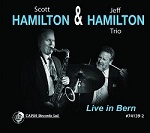 I
don’t often venture outside the classical sphere in reviewing for MusicWeb-International
and when I do recommend a jazz recording it’s usually something tried
and tested, though occasionally I branch out to make a ‘discovery’ as
a tailpiece to Download News.
I
don’t often venture outside the classical sphere in reviewing for MusicWeb-International
and when I do recommend a jazz recording it’s usually something tried
and tested, though occasionally I branch out to make a ‘discovery’ as
a tailpiece to Download News.
In a sense this album is a discovery since it represents the first time
that Scott Hamilton has come together with the Jeff Hamilton Trio, though
they have recorded for the same label. The recording arose from a live
session together at Marians Jazzroom in Bern, though it’s something
of a misnomer to include the word ‘live’ in the title: I understand
that the recording sessions took place several days after the live concert.
The music is all straight and easy and that’s the way that I like it
– ideal for last night listening as a change from the likes of Late
Night Brubeck. (If that were an LP I’d have worn it out, the number
of times that my wife asks to play it.)
The programme is all from old favourite composers apart from Jeff Hamilton’s
own Sybille’s Day and that’s pretty straight and easy, too –
and very enjoyable. It’s the kind of music that the sax was made for
and I can’t imagine it being played any better. Scott Hamilton is a
most accomplished player and he’s very well supported here all round.
As Tony Augarde aptly put it in reviewing another Scott Hamilton recording,
he has perfected the art of playing with the emphasis on melody and
beauty of sound – review
– and that’s just right for me. If I have to nominate a favourite number,
I recommend that you sample Billy Strayhorn’s Ballad for very tired
and very sad Lotus Eaters (track 11).
The last thing that I want to suggest is that this album is predictable
but you won’t find anything here to shake you to your foundations.
One of the other offerings for review this month was the latest album
from Sun-Ra: A joyful Noise. Sorry, that’s not for me. Nor,
I have to say, is the very successful and critically hailed series of
recordings which Jan Garbarek made with the Hilliard Ensemble for ECM,
with solo sax winding its mournful way through renaissance vocal music
and folk music (Officium, Officium Novum – review
– and Mnemosyme). It’s very beautiful but it leaves me feeling
depressed whereas this new recording leaves me with a feeling of enjoyment
and content.
The recording is good – close but not too close. The streamed version
to which I listened, and even its download equivalent, come without
the booklet, so I can’t comment on that: the details that I’ve given
were all gleaned online. Even without the booklet, however, I shall
be listening to this album quite often.
A Song of Farewell – Music of Mourning and Consolation
Orlando GIBBONS (1583-1625) arr. Percy DEARMER (1867-1936)
Drop, drop, slow tears [2:00]
William WALTON (1902-1983) A Litany; Drop, drop, slow tears
[4:25]
Robert WHITE (c.1538-1574) Christe, qui lux es et dies [4:29]
James MacMILLAN (b.1959) A child’s prayer [4:12]
John SHEPPARD (c.1515-1550) In manus tuas [4:05]
Jonathan DOVE (b.1959) Into thy hands [8:14]
Thomas MORLEY (1557/8-1602) Funeral Sentences [10:16]
Edward ELGAR (1857-1934) They are at rest [3:31]
Herbert HOWELLS (1892-1983) Requiem [24:02]
C. Hubert H. PARRY (1848-1918) Lord, let me know mine end (Songs
of Farewell) [11:42]
The Gabrieli Consort/Paul McCreesh – rec. November 2009. DDD
Texts and translations included.
SIGNUM RECORDS SIGCD281 [75:56] – from hyperion-records.co.uk
(mp3, 16- and 24-bit lossless with pdf booklet)
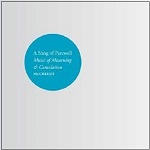 When
I reviewed this in July
2012/1 I complained about the lack of a booklet from classicsonline.com.
I thought that I had more recently given a link to the download from
hyperion-records.co.uk
where it’s available in mp3, 16- and 24-bit lossless and comes complete
with the booklet to add strength to my recommendation, but I can’t find
any record that I did so. The download from eclassical.com,
mp3 and lossless but no 24-bit, also comes with the necessary booklet.
For UK£ purchasers Hyperion’s £7.99 for 16-bit is less expensive than
eclassical.com’s $13.94. 24-bit is still very reasonable at £9.00.
When
I reviewed this in July
2012/1 I complained about the lack of a booklet from classicsonline.com.
I thought that I had more recently given a link to the download from
hyperion-records.co.uk
where it’s available in mp3, 16- and 24-bit lossless and comes complete
with the booklet to add strength to my recommendation, but I can’t find
any record that I did so. The download from eclassical.com,
mp3 and lossless but no 24-bit, also comes with the necessary booklet.
For UK£ purchasers Hyperion’s £7.99 for 16-bit is less expensive than
eclassical.com’s $13.94. 24-bit is still very reasonable at £9.00.
Classicsonlinehd.com, though they now offer both 16- and 24-bit versions
of this recording, still fail to include the booklet and their 24-bit
is overpriced at £15.99. Subscribers stream here.
Qobuz offer the booklet but provide only a 16-bit version: subscribers
can stream here.
